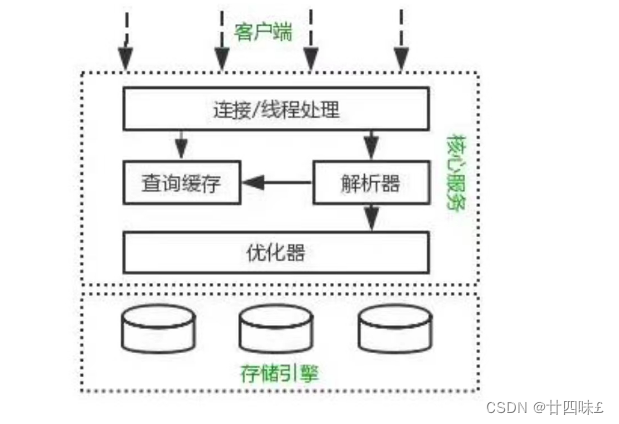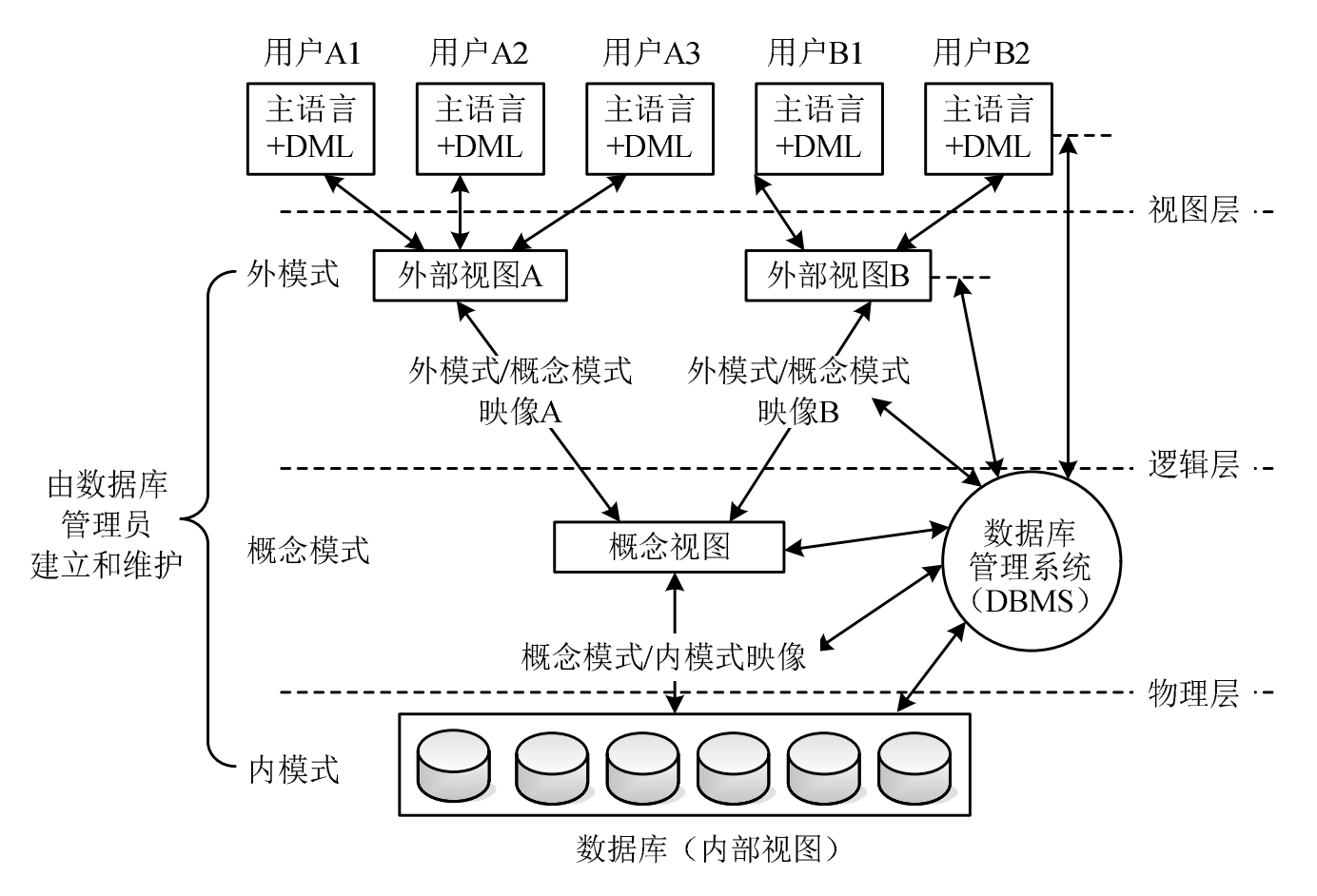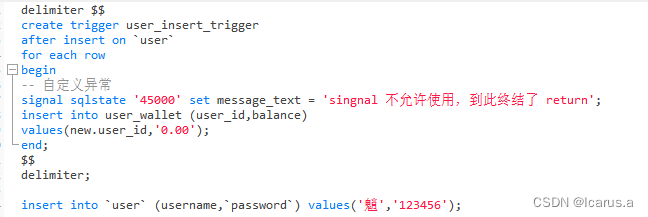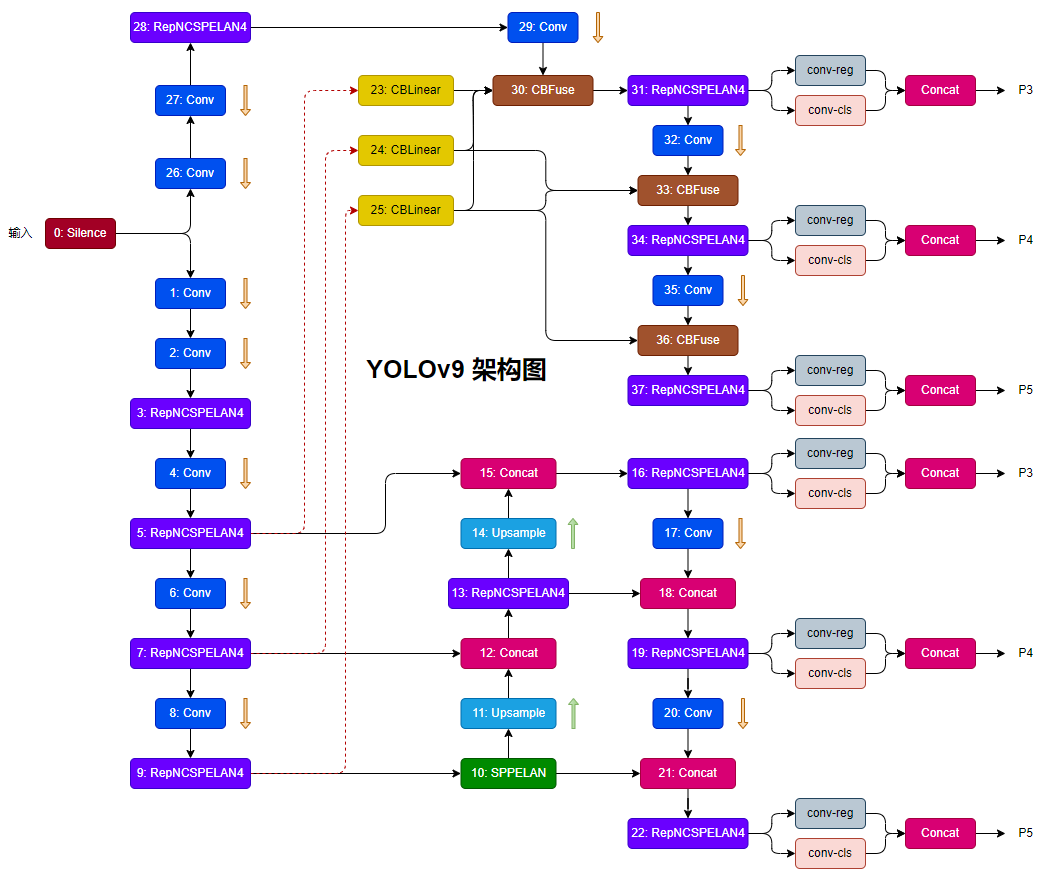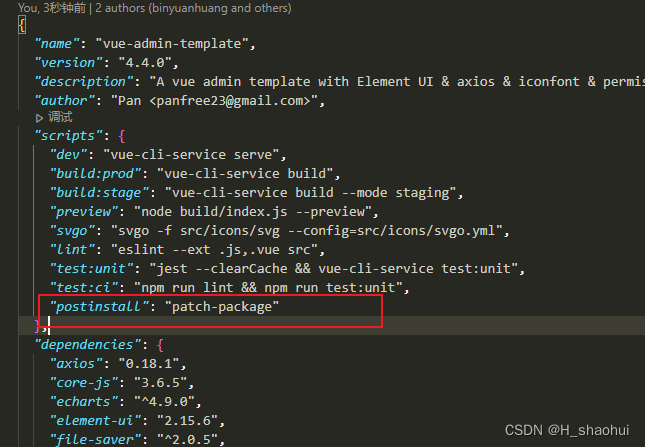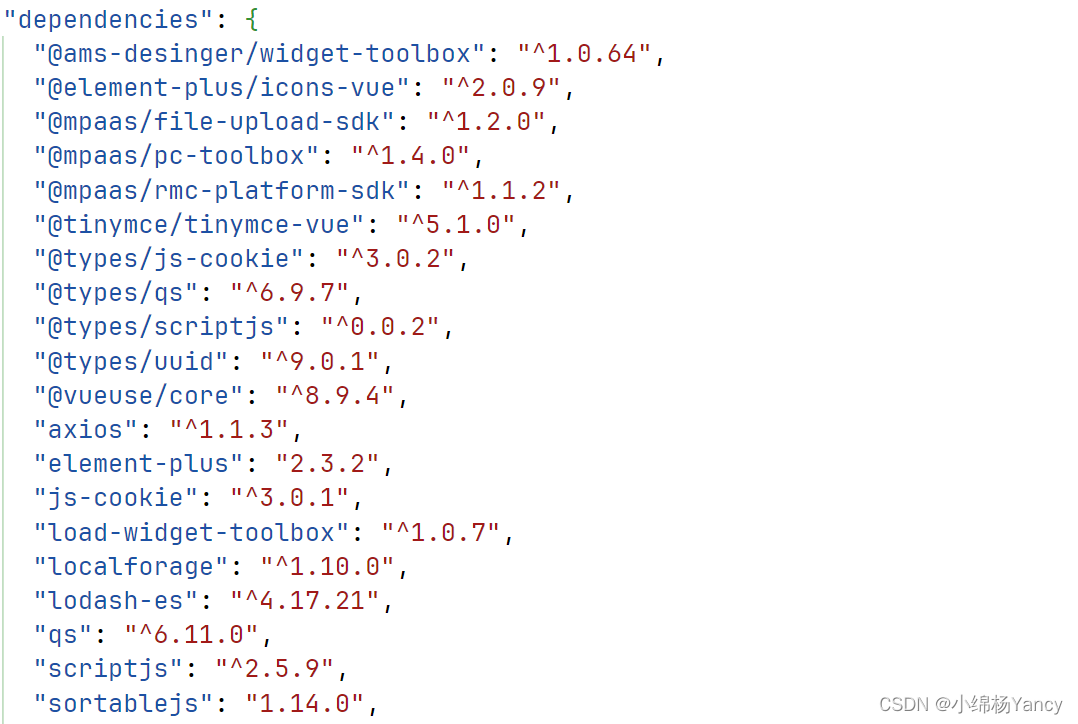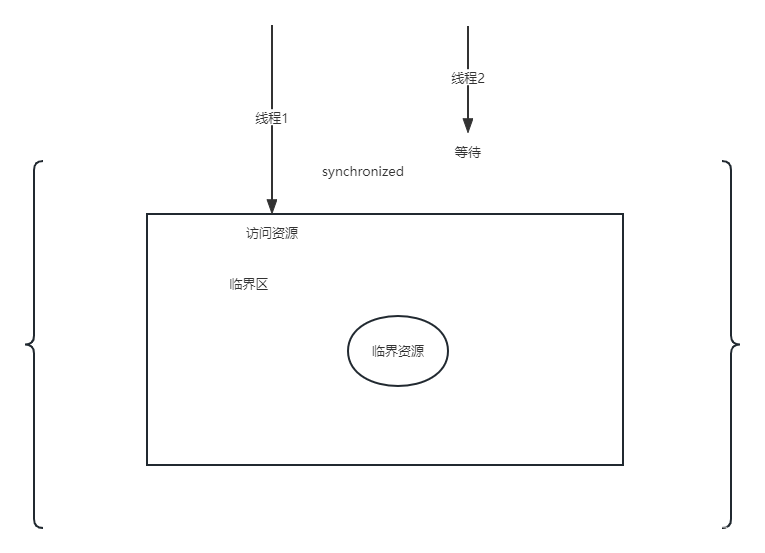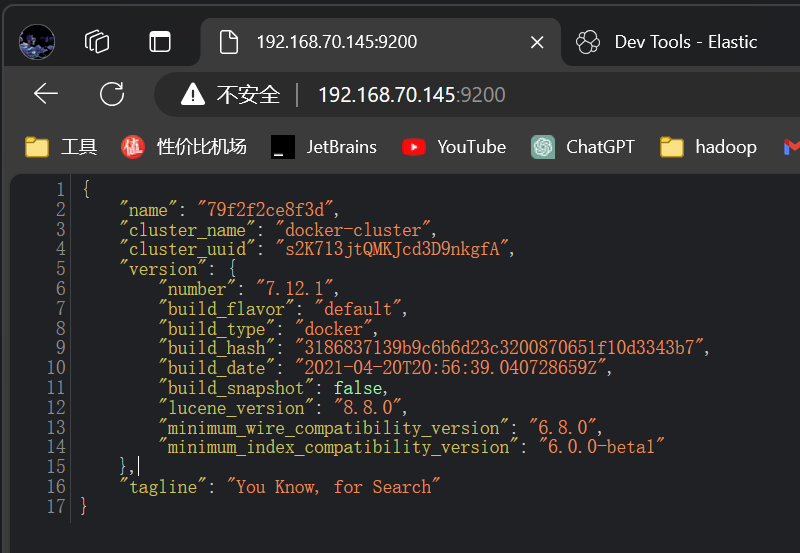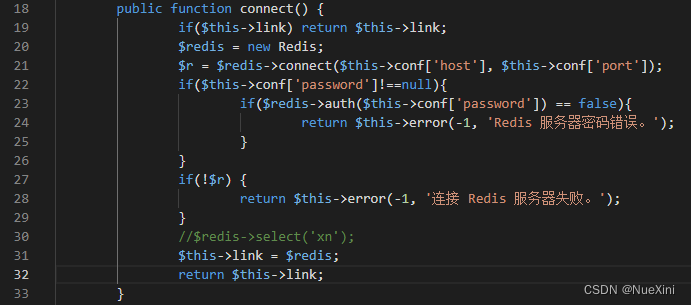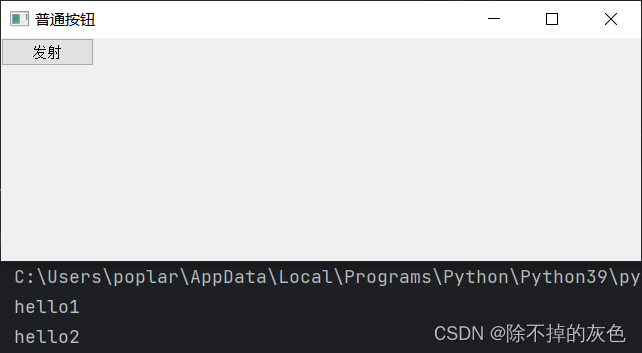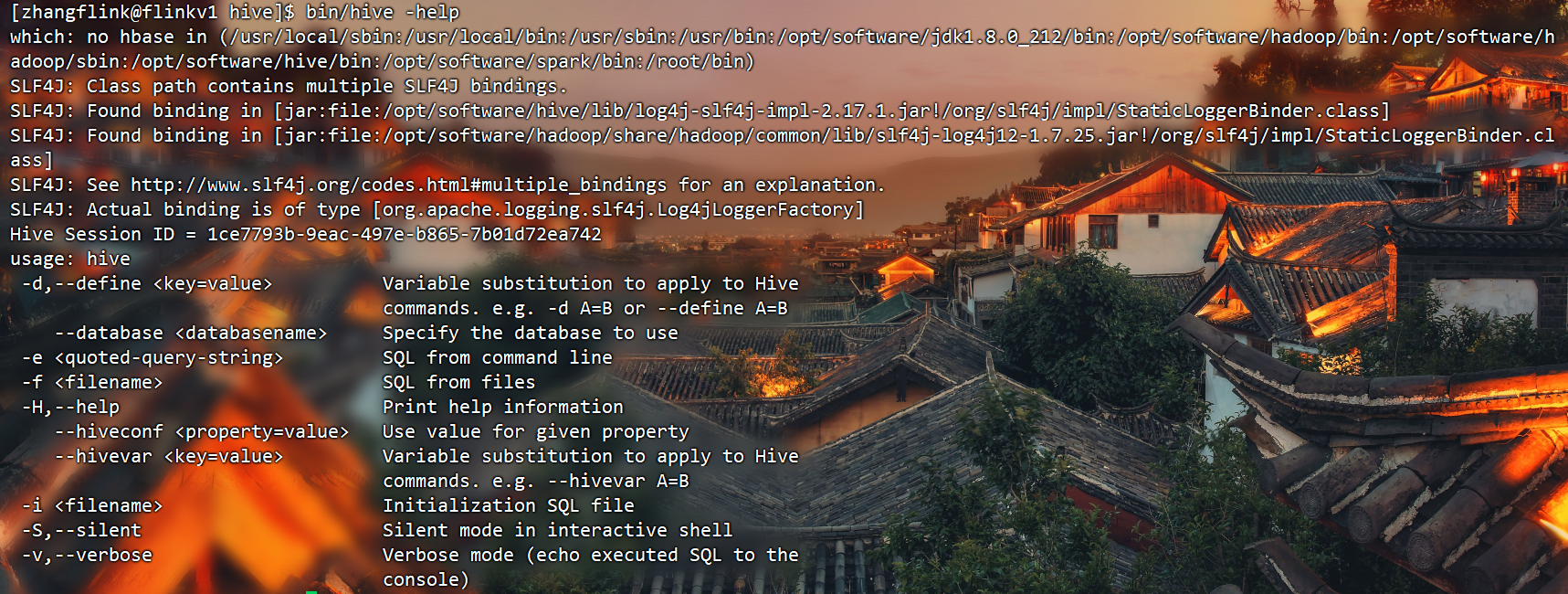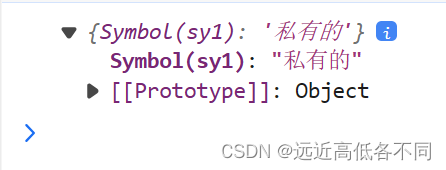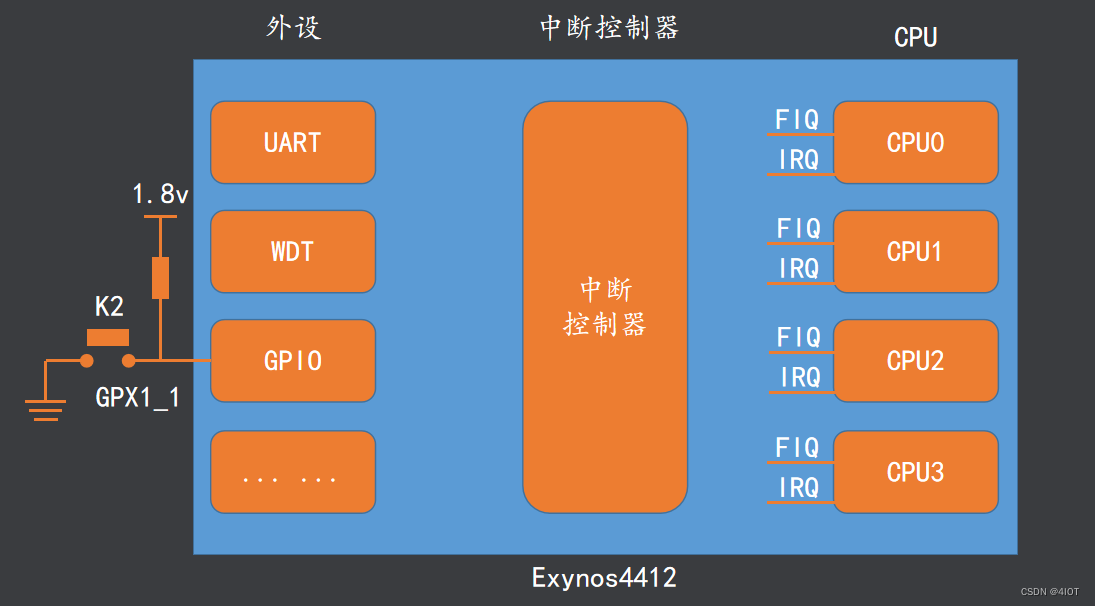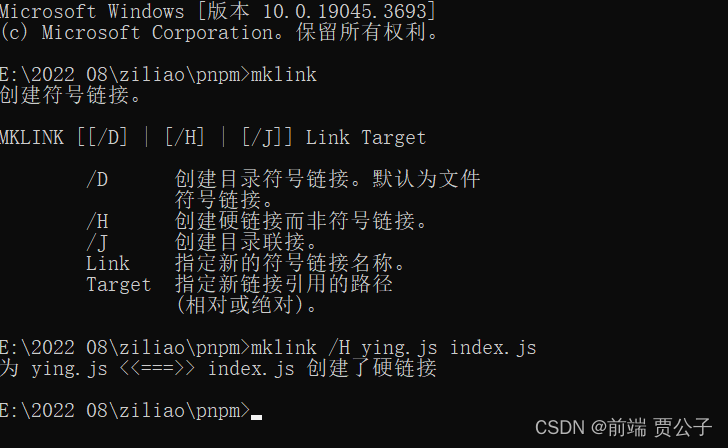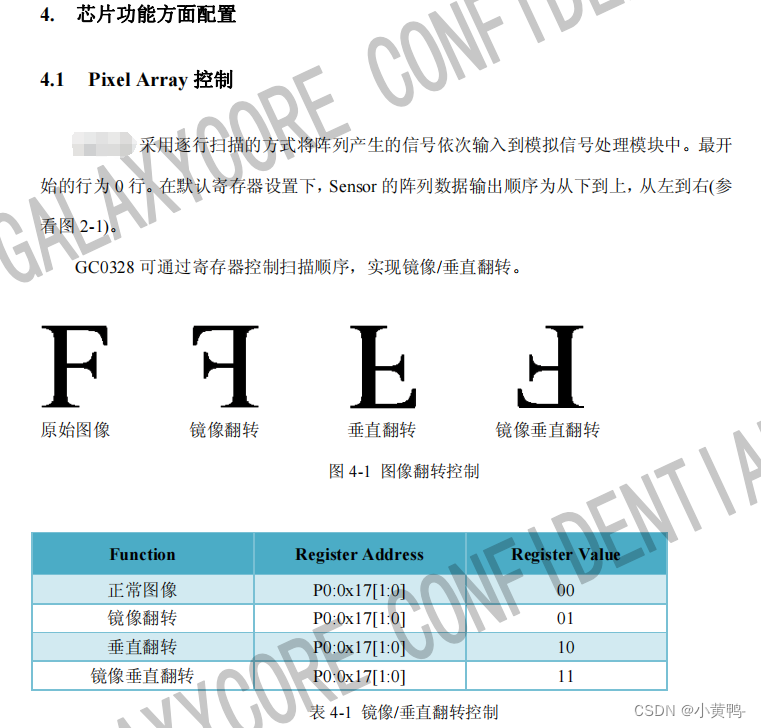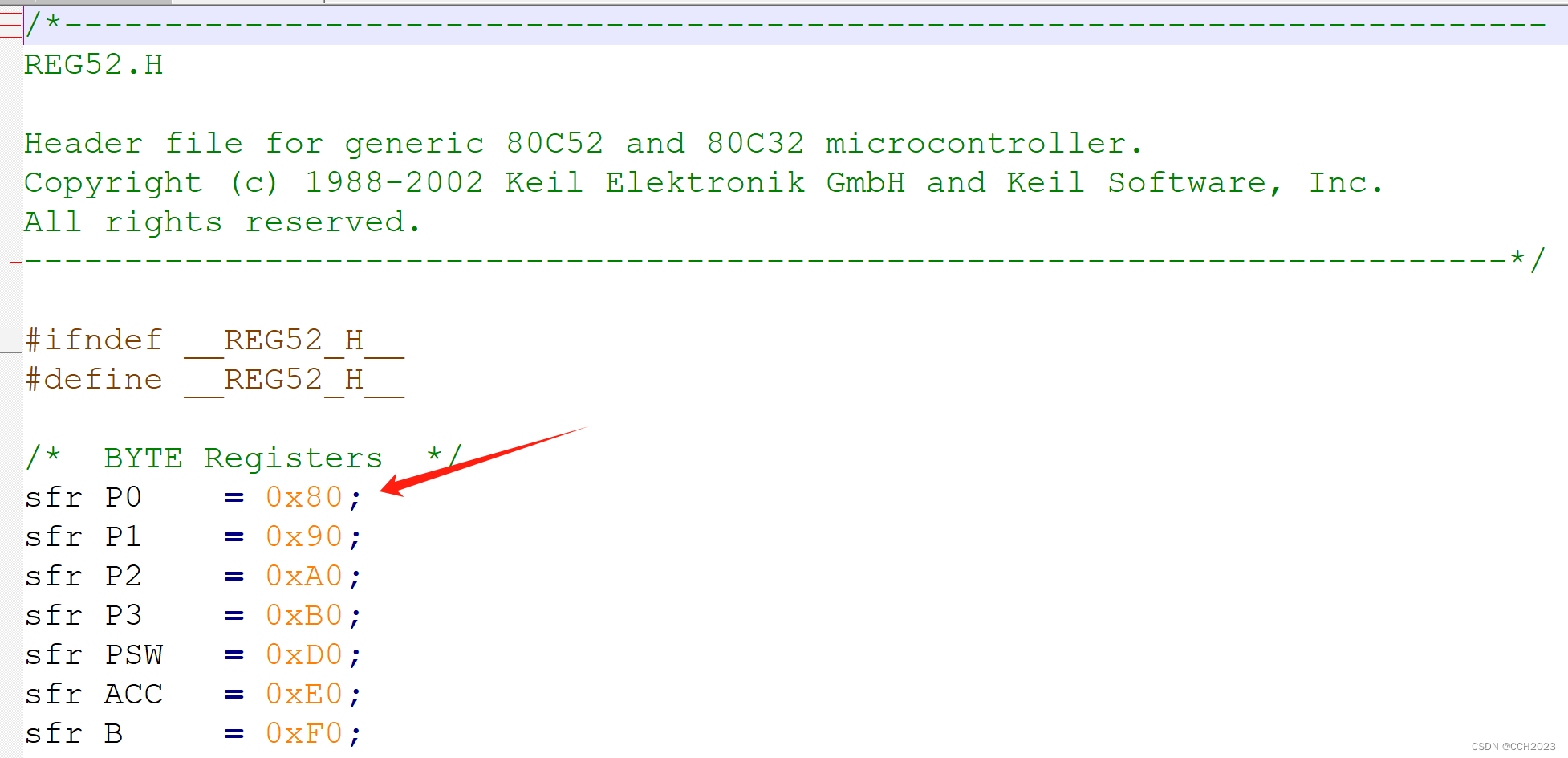STL定义了强大的、基于模板的、可复用的组件,实现了许多通用的数据结构及处理这些数据结构的算法。其中包含三个关键组件——容器(container,流行的模板数据结构)、迭代器(iterator)和算法(algorithm)。
| 组件 | 描述 |
|---|---|
| 容器 | 容器是用来管理某一类对象的集合。C++ 提供了各种不同类型的容器,比如 deque、list、vector、map 等。 |
| 迭代器 | 迭代器用于遍历对象集合的元素。这些集合可能是容器,也可能是容器的子集。 |
| 算法 | 算法作用于容器。它们提供了执行各种操作的方式,包括对容器内容执行初始化、排序、搜索和转换等操作。 |
第18.1节 容器介绍
STL容器,可将其分为四类:序列容器、有序关联容器、无序关联容器、容器适配器
序列容器:
| 标准库容器类 | 描述 |
|---|---|
| array | 固定大小,直接访问任意元素 |
| deque | 从前部或后部进行快速插入和删除操作,直接访问任何元素 |
| forward_list | 单链表,在任意位置快速插入和删除 |
| list | 双向链表,在任意位置进行快速插入和删除操作 |
| vector | 从后部进行快速插入和删除操作,直接访问任意元素 |
有序关联容器:
| 标准库容器类 | 描述 |
|---|---|
| set | 快速查找,无重复元素 |
| multiset | 快速查找,可有重复元素 |
| map | 一对一映射,无重复元素,基于键快速查找 |
| multimap | 一对一映射,可有重复元素,基于键快速查找 |
无序关联容器
| 标准库容器类 | 描述 |
|---|---|
| unordered_set | 快速查找,无重复元素 |
| unordered_multiset | 快速查找,可有重复元素 |
| unordered_map | 一对一映射,无重复元素,基于键快速查找 |
| unordered_multimap | 一对一映射,可有重复元素,基于键快速查找 |
容器适配器:
| 标准库容器类 | 描述 |
|---|---|
| stack | 后进先出(LIFO) |
| queue | 先进先出(FIFO) |
| priority_queue | 优先级最高的元素先出 |
序列容器描述了线性的数据结构(也就是说,其中的元素在概念上” 排成一行"), 例如数组、向量和 链表。关联容器描述非线性的容器,它们通常可以快速锁定其中的元素。这种容器可以存储值的集合或 者键-值对。栈和队列都是在序列容器的基础上加以约束条件得到的,因此STL把stack和queue作为容器适配器来实现,这样就可以使程序以一种约束方式来处理线性容器。类型string支持的功能跟线性容器一样, 但是它只能存储字符数据。
第18.2节 迭代器简介
迭代器在很多方面与指针类似,也是用于指向首类容器中的元素(还有一些其他用途,后面将会提到)。 迭代器存有它们所指的特定容器的状态信息,即迭代器对每种类型的容器都有一个实现。 有些迭代器的操作在不同容器间是统一的。 例如,*运算符间接引用一个迭代器,这样就可以使用它所指向的元素。++运算符使得迭代器指向容器中的下一个元素(和数组中指针递增后指向数组的下一个元素类似)。
STL 首类容器提供了成员函数 begin 和 end。函数 begin 返回一个指向容器中第一个元素的迭代器,函数end 返回一个指向容器中最后一个元素的下一个元素(这个元素并不存在,常用于判断是否到达了容器的结束位仅)的迭代器。 如果迭代器 i 指向一个特定的元素,那么 ++i 指向这个元素的下一个元素。i 指代的是i指向的元素。 从函数 end 中返回的迭代器只在相等或不等的比较中使用,来判断这个“移动的迭代器” (在这里指i)是否到达了容器的末端。
使用一个* iterator** 对象来指向一个可以修改的容器元素,使用一个 const_iterator 对象来指向一个不能修改的容器元素。
| 类型 | 描述 |
|---|---|
| 随机访问迭代器(random access) | 在双向迭代器基础上增加了直接访问容器中任意元素的功能, 即可以向前或向后跳转任意个元素 |
| 双向迭代器(bidirectional) | 在前向迭代器基础上增加了向后移动的功能。支持多遍扫描算法 |
| 前向迭代器(forword) | 综合输入和输出迭代器的功能,并能保持它们在容器中的位置作为状态信息),可以使用同一个迭代器两次遍历一个容器(称为多遍扫描算法) |
| 输出迭代器(output) | 用于将元素写入容器。 输出迭代器每次只能向前移动一个元索。 输出迭代器只支持一遍扫描算法,不能使用相同的输出迭代器两次遍历一个序列容器 |
| 输入迭代器(input) | 用于从容器读取元素。 输入迭代器每次只能向前移动一个元素。 输入迭代器只支持一遍扫描算法,不能使用相同的输入迭代器两次遍历一个序列容器 |
每种容器所支持的迭代器类型决定了这种容器是否可以在指定的 STL 算法中使用。 支持随机访问迭代器的容器可用于所有的 STL 算法(除了那些需要改变容器大小的算法,这样的算法不能在数组和 array对象中使用)。指向数组的指针可以代替迭代器用于几乎所有的 STL 算法中,包括那些要求随机访问迭代器的算法。 下表显示了每种 STL 容器所支持的迭代器类型。 注意, vector 、 deque 、 list 、 set、 multiset 、 map 、 multimap以及 string 和数组都可以使用迭代器遍历。
| 容器 | 支持的迭代器类型 | 容器 | 支持的迭代器类型 |
|---|---|---|---|
| vector | 随机访问迭代器 | set | 双向迭代器 |
| array | 随机访问迭代器 | multiset | 双向迭代器 |
| deque | 随机访问迭代器 | map | 双向迭代器 |
| list | 双向迭代器 | multimap | 双向迭代器 |
| forword_list | 前向迭代器 | unordered_set | 双向迭代器 |
| stack | 不支持迭代器 | unordered_multiset | 双向迭代器 |
| queue | 不支持迭代器 | unordered_map | 双向迭代器 |
| priority_queue | 不支持迭代器 | unordered_multimap | 双向迭代器 |
下表显示了在 STL容器的类定义中出现的几种预定义的迭代器 typedef。不是每种 typedef 都出现在每个容器中。 我们使用常量版本的迭代器来访问只读容器或不应该被更改的非只读容器,使用反向迭代器来以相反的方向访问容器。
| 为迭代器预先定义的typedef | ++的方向 | 读写能力 |
|---|---|---|
| iterator | 向前 | 读/写 |
| const_iterator | 向前 | 读 |
| reverse_iterator | 向后 | 读/写 |
| const_reverse_iterator | 向后 | 读 |
下表显示了可作用在每种迭代器上的操作。 除了给出的对于所有迭代器都有的运算符,迭代器还必须提供默认构造函数、拷贝构造函数和拷贝赋值操作符。 前向迭代器支持++和所有的输入和输出迭代器的功能。 双向迭代器支持–操作和前向迭代器的功能。 随机访问迭代器支持所有在表中给出的操作。 另外, 对于输入迭代器和输出迭代器,不能在保存迭代器之后再使用保存的值。
| 迭代器操作 | 描述 |
|---|---|
| 适用所有迭代器的操作 | |
| ++p | 前置自增迭代器 |
| p++ | 后置自增迭代器 |
| p=p1 | 将一个迭代器赋值给另一个迭代器 |
| 输入迭代器(input) | |
| *p | 间接引用一个迭代器 |
| p->m | 使用迭代器读取元素m |
| p==p1 | 比较两个迭代器是否相等 |
| p!=p1 | 比较两个迭代器是否不相等 |
| 输出迭代器 | |
| *p | 间接引用一个迭代器 |
| p=p1 | 把一个迭代器赋值给另一个 |
| 前向迭代器 | 前向迭代器提供了输入和输出迭代器的所有功能 |
| 双向迭代器 | |
| –-p | 前置自减迭代器 |
| p–- | 后置自减迭代器 |
| 随机访问迭代器 | |
| p+=i | 迭代器p前进i个位置 |
| p=i | 迭代器p后退i个位置 |
| p+i | 在迭代器p的位置上前进i个位置 |
| p-i | 在迭代器p的位置上后退i个位置 |
| p-p1 | 表达式的值是一个整数,它代表同一个容器中两个元素间的距离 |
| p[i] | 返回与迭代器p的位置相距i的元素 |
| p<p1 | 若迭代器p小于p1(即容器中p在p1前)则返回 true, 否则返回 false |
| p<=p1 | 若迭代器p小千或等于p1 (即容器中p 在p1前或位咒相同)则返回 true, 否则返回 false |
| p>p1 | 若迭代器p 大于p1(即容器中p在p1后)则返回true, 否则返回false |
| p>=p1 | 若迭代器p大于或等于p1(即容楛中p在p1后或位置相同)则返回 true, 否则返回 false |
第18.3节 map与unordered_map(红黑树VS哈希表)
C++11 增加了无序容器 unordered_map/unordered_multimap 和unordered_set/unordered_multiset,由于这些容器中的元素是不排序的,因此,比有序容器map/multimap 和 set/multiset 效率更高。 map 和 set 内部是红黑树,在插入元素时会自动排序,而无序容器内部是散列表( Hash Table),通过哈希( Hash),而不是排序来快速操作元素,使得效率更高。由于无序容器内部是散列表,因此无序容器的 key 需要提供hash_value 函数,其他用法和map/set 的用法是一样的。不过对于自定义的 key,需要提供 Hash 函数和比较函数。
18.3.1 map和unordered_map的差别
- 需要引入的头文件不同
map: #include < map >
unordered_map: #include < unordered_map >
- 内部实现机理不同
- map: map内部实现了一个红黑树(红黑树是非严格平衡二叉搜索树,而AVL是严格平衡二叉搜索树),红黑树具有自动排序的功能,因此map内部的所有元素都是有序的,红黑树的每一个节点都代表着map的一个元素。
- unordered_map: unordered_map内部实现了一个哈希表(也叫散列表,通过把关键码值映射到Hash表中一个位置来访问记录,查找的时间复杂度可达到O(1),其在海量数据处理中有着广泛应用)。因此,其元素的排列顺序是无序的。
18.3.2 优缺点以及适用处
map:
- 优点:
有序性,这是map结构最大的优点,其元素的有序性在很多应用中都会简化很多的操作
红黑树,内部实现一个红黑书使得map的很多操作在lgn的时间复杂度下就可以实现,因此效率非
常的高 - 缺点:
空间占用率高,因为map内部实现了红黑树,虽然提高了运行效率,但是因为每一个节点都需要额
外保存父节点、孩子节点和红/黑性质,使得每一个节点都占用大量的空间 - 适用处:
对于那些有顺序要求的问题,用map会更高效一些
unordered_map:
- 优点: 因为内部实现了哈希表,因此其查找速度非常的快
- 缺点: 哈希表的建立比较耗费时间
- 适用处:对于查找问题,unordered_map会更加高效一些,因此遇到查找问题,常会考虑一下用
unordered_map
18.3.3 总结
- 内存占有率的问题就转化成红黑树 VS hash表 , 还是unorder_map占用的内存要高。
- 但是unordered_map执行效率要比map高很多
- 对于unordered_map或unordered_set容器,其遍历顺序与创建该容器时输入的顺序不一定相同,因为遍历是按照哈希表从前往后依次遍历的
第18.4节 STL范例
18.4.1 vector
18.4.1.1 constructors
#include <iostream>
#include <vector>
#include <string>
#include <algorithm>
using namespace std;
int main ()
{
string str[]={
"Alex","John","Robert"};
// empty vector object
vector<int> v1;
// creates vector with 10 empty elements
vector<int> v2(10);
// creates vector with 10 elements,
// and assign value 0 for each
vector<int> v3(10,0);
// creates vector and assigns
// values from string array
vector<string> v4(str+0,str+3);
vector<string>::iterator sIt = v4.begin();
while ( sIt != v4.end() )
cout << *sIt++ << " ";
cout << endl;
// copy constructor
vector<string> v5(v4);
for ( int i=0; i<3; i++ )
cout << v5[i] << " ";
cout << endl;
return 0;
}
OUTPUT:
// Alex John Robert
// Alex John Robert
18.4.1.2 assign
#include <iostream>
#include <vector>
#include <algorithm>
#include <iterator>
using namespace std;
int main ()
{
int ary[]={
1,2,3,4,5};
vector<int> v;
// assign to the "v" the contains of "ary"
v.assign(ary,ary+5);
copy(v.begin(), v.end(), ostream_iterator<int>(cout," "));
cout << endl;
// replace v for 3 copies of 100
v.assign(3,100);
copy(v.begin(), v.end(), ostream_iterator(cout," "));
cout << endl;
return 0;
}
OUTPUT:
// 1 2 3 4 5
// 100 100 100
18.4.1.3 at
#include <iostream>
#include <vector>
using namespace std;
int main ()
{
vector<int> v(3,0);
v[0] = 100;
v.at(1) = 200;
for ( int i=0; i<3; i++ )
cout << v.at(i) << " ";
cout << endl;
return 0;
}
OUTPUT:
// 100 200 0
18.4.1.4 back
#include <iostream>
#include <vector>
#include <string>
#include <iterator>
using namespace std;
template<class T, class D>
class Member
{
public:
Member(T t, D d) : name(t), sal(d) {
}
void print();
private:
T name;
D sal;
};
template<class T, class D>
void Member::print()
{
cout << name << " " << sal << endl;
}
//======================================
int main ()
{
typedef Member<string,double> M;
vector<M> v;
v.push_back(M("Robert",60000));
v.push_back(M("Linda",75000));
vector<M>::iterator It = v.begin();
cout << "Entire vector:" << endl;
while ( It != v.end() )
(It++)->print();
cout << endl;
cout << "Return from back()" << endl;
v.back().print();
return 0;
}
OUTPUT:
// Entire vector:
// Robert 60000
// Linda 75000
//
// Return from back()
// Linda 75000
18.4.1.5 begin
#include <iostream>
#include <vector>
#include <iterator>
#include <numeric>
using namespace std;
int main ()
{
vector<int> v(5);
iota(v.begin(),v.end(),1);
vector<int>::iterator It = v.begin();
while ( It != v.end() )
cout << *It++ << " ";
cout << endl;
// third element of the vector
It = v.begin()+2;
cout << *It << endl;
return 0;
}
OUTPUT:
// 1 2 3 4 5
// 3
18.4.1.6 capacity
#include <iostream>
#include <vector>
using namespace std;
int main ()
{
vector<int> v(10);
cout << "Size of v = "
<< v.size() << endl;
cout << "Capacity of v = "
<< v.capacity() << endl;
v.resize(100);
cout << "After resizing:" << endl;
cout << "Size of v = "
<< v.size() << endl;
cout << "Capacity of v = "
<< v.capacity() << endl;
return 0;
}
OUTPUT:
// Size of v = 10
// Capacity of v = 10
// After resizing:
// Size of v = 100
// Capacity of v = 100
18.4.1.7 clear
#include <iostream>
#include <vector>
#include <algorithm>
using namespace std;
template <class T>
class Print
{
public:
void operator () (T& t)
{
cout << t << " ";
}
};
//==============================
int main ()
{
vector<int> v(10);
Print<int> print;
fill(v.begin(),v.end(),5);
cout << "Vector v : ";
for_each(v.begin(),v.end(),print);
cout << endl;
cout << "Size of v = " << v.size()
<< endl;
cout << "v.clear" << endl;
v.clear();
cout << "Vector v : ";
for_each(v.begin(),v.end(),print);
cout << endl;
cout << "Size of v = " << v.size()
<< endl;
cout << "Vector v is ";
v.empty() ? cout << "" : cout << "not ";
cout << "empty" << endl;
return 0;
}
// Vector v : 5 5 5 5 5 5 5 5 5 5
// Size of v = 10
// v.clear
// Vector v :
// Size of v = 0
// Vector v is empty
18.4.1.8 empty
#include <iostream>
#include <vector>
using namespace std;
int main ()
{
vector<int> v;
cout << "Vector is ";
v.empty() ? cout << "" : cout << "not ";
cout << "empty" << endl;
v.push_back(100);
cout << "Vector is ";
v.empty() ? cout << "" : cout << "not ";
cout << "empty" << endl;
return 0;
}
// Vector is empty
// Vector is not empty
18.4.1.9 end
#include <iostream>
#include <vector>
#include <iterator>
#include <numeric>
using namespace std;
int main ()
{
vector<int> v(5);
iota(v.begin(),v.end(),1);
vector<int>::iterator It = v.begin();
while ( It != v.end() )
cout << *It++ << " ";
cout << endl;
// last element of the vector
It = v.end()-1;
cout << *It << endl;
return 0;
}
OUTPUT:
// 1 2 3 4 5
// 5
18.4.1.10 erase
#include <iostream>
#include <vector>
#include <iterator>
#include <algorithm>
using namespace std;
int main ()
{
vector<int> v(10);
vector<int>::iterator It;
for ( int i=0; i<10; i++ )
v[i] = i+1;
copy(v.begin(),v.end(),
ostream_iterator<int>(cout," "));
cout << endl;
It = v.begin()+2;
// remove third element
v.erase(It);
copy(v.begin(),v.end(),
ostream_iterator<int>(cout," "));
cout << endl;
It = v.begin();
// remove 2 elements from beginning fo v
v.erase(It,It+2);
copy(v.begin(),v.end(),
ostream_iterator<int>(cout," "));
cout << endl;
return 0;
}
OUTPUT:
// 1 2 3 4 5 6 7 8 9 10
// 1 2 4 5 6 7 8 9 10
// 4 5 6 7 8 9 10
18.4.1.11 front
#include <iostream>
#include <vector>
#include <string>
#include <iterator>
using namespace std;
template<class T, class D>
class Member
{
public:
Member(T t, D d) : name(t), sal(d) {
}
void print();
private:
T name;
D sal;
};
template<class T, class D>
void Member::print()
{
cout << name << " " << sal << endl;
}
//======================================
int main ()
{
typedef Member<string,double> M;
vector<M> v;
v.push_back(M("Linda",75000));
v.push_back(M("Robert",60000));
vector<M>::iterator It = v.begin();
cout << "Entire vector:" << endl;
while ( It != v.end() )
(It++)->print();
cout << endl;
cout << "Return from front()" << endl;
v.front().print();
return 0;
}
OUTPUT:
// Entire vector:
// Linda 75000
// Robert 60000
//
// Return from front()
// Linda 75000
18.4.1.12 insert
#include <iostream>
#include <vector>
#include <iterator>
#include <algorithm>
using namespace std;
template <class T>
class Print
{
public:
void operator () (T& t)
{
cout << t << " ";
}
};
//=============================
int main ()
{
int ary[5];
fill(ary,ary+5,1);
vector<int> v;
vector<int>::iterator It;
Print<int> print;
copy(ary,ary+5,
back_inserter(v));
cout << "vector v : ";
for_each(v.begin(),v.end(),print);
cout << endl;
It = v.begin();
// insert value "5" at the position "It"
cout << "v.insert(It,5) : ";
v.insert(It,5);
for_each(v.begin(),v.end(),print);
cout << endl;
// insert range ary+2 - ary+5 at the position "It"
It = v.begin()+5;
cout << "v.insert(It,ary+2,ary+5 : ";
v.insert(It,ary+2,ary+5);
for_each(v.begin(),v.end(),print);
cout << endl;
// insert 2 value of "20" at the position "It"
It = v.end()-2;
cout << "v.insert(It,2,20) : ";
v.insert(It,2,20);
for_each(v.begin(),v.end(),print);
cout << endl;
return 0;
}
OUTPUT:
// vector v : 1 1 1 1 1
// v.insert(It,5) : 5 1 1 1 1 1
// v.insert(It,ary+2,ary+5 : 5 1 1 1 1 1 1 1 1
// v.insert(It,2,20) : 5 1 1 1 1 1 1 20 20 1 1
18.4.1.13 max_size
#include <iostream>
#include <vector>
using namespace std;
int main ()
{
vector<int> v(10);
cout << "Size of v = "
<< v.size() << endl;
cout << "Max_size of v = "
<< v.max_size() << endl;
return 0;
}
OUTPUT:
// Size of v = 10
// Max_size of v = 1073741823
pop_back
#include <iostream>
#include <vector>
#include <algorithm>
using namespace std;
template <class T>
class Print
{
public:
void operator () (T& t)
{
cout << t << " ";
}
};
//=============================
int main ()
{
vector<int> v;
Print<int> print;
for ( int i=0; i<5; i++ )
v.push_back(i+1);
while ( !v.empty() )
{
for_each(v.begin(),v.end(),print);
cout << endl;
v.pop_back();
}
return 0;
}
OUTPUT:
// 1 2 3 4 5
// 1 2 3 4
// 1 2 3
// 1 2
// 1
18.4.1.14 push_back
#include <iostream>
#include <vector>
#include <string>
#include <iterator>
using namespace std;
template <class T>
class Name
{
public:
Name(T t) : name(t) {
}
void print()
{
cout << name << " ";
}
private:
T name;
};
//=============================
int main ()
{
typedef Name<string> N;
typedef vector<N> V;
V v;
N n1("Robert");
N n2("Alex");
v.push_back(n1);
v.push_back(n2);
// unnamed object of the type Name
v.push_back(N("Linda"));
V::iterator It = v.begin();
while ( It != v.end() )
(It++)->print();
cout << endl;
return 0;
}
OUTPUT:
// Robert Alex Linda
18.4.1.15 rbegin and rend
#include <iostream>
#include <iomanip>
#include <vector>
#include <string>
#include <algorithm>
#include <iterator>
using namespace std;
class ID
{
friend bool operator < ( const ID&, const ID& );
public:
ID(string name,int score) : name(name), score(score) {
}
void display ()
{
cout.setf(ios::left);
cout << setw(3) << score << name << endl;
}
private:
string name; int score;
};
//-----------------------------------------------------
// comperation function for sorting
bool operator < ( const ID& a, const ID& b )
{
return a.score < b.score;
}
//-----------------------------------------------------
typedef vector<ID> Vector; // new name for existing datatype
int main ()
{
Vector v;
Vector::iterator Iter;
v.push_back(ID("Smith A",96));
v.push_back(ID("Amstrong B.",91));
v.push_back(ID("Watson D.",82));
for ( Iter = v.begin(); Iter != v.end(); Iter++ )
Iter->display();
sort(v.begin(),v.end()); // sort algorithm
cout << endl << "Sorted by Score" << endl;
cout << "===============" << endl;
for ( Iter = v.begin(); Iter != v.end(); Iter++ )
Iter->display();
cout << endl << "Reverse output" << endl;
cout << "===============" << endl;
Vector::reverse_iterator r = v.rbegin();
while ( r != v.rend() )
cout << r->display();
cout << endl;
return 0;
}
OUTPUT:
// 96 Smith A.
// 91 Amstrong B.
// 82 Watson D.
//
// Sorted by Score
// ===============
// 82 Watson D.
// 91 Amstrong B.
// 96 Smith A.
//
// Reverse output
// ===============
// 96 Smith A.
// 91 Amstrong B.
// 82 Watson D.
18.4.1.16 reserve
#include <iostream>
#include <vector>
using namespace std;
int main ()
{
vector<int> v(5,0); // 5 elements, each - value 0
/*------------------------------------------------*/
cout << "Size of v = " << v.size() << endl;
cout << "Capacity v = " << v.capacity() << endl;
cout << "Value of each element is - ";
for ( int i = 0; i < v.size(); i++ )
cout << v[i] << " ";
cout << endl;
v[0] = 5; // new value for first element
v[1] = 8;
v.push_back(3); // creates new (6th) element of vector,
v.push_back(7); // automatically increases size
cout << endl; // capacity of vector v
cout << "Size of v = " << v.size() << endl;
cout << "Capacity v = " << v.capacity() << endl;
cout << "Value of each element is - ";
for ( int i = 0; i < v.size(); i++ )
cout << v[i] << " ";
cout << endl << endl;
v.reserve(100); // increase capacity to 100
cout << "Size of v1_int = " << v.size() << endl;
cout << "Capacity v1_int = " << v.capacity() << endl;
int size = sizeof(v); // how big is vector itself
cout << "sizeof v = " << size << endl;
return 0;
}
OUTPUT:
// Size of v = 5
// Capacity v = 5
// Value of each element is - 0 0 0 0 0
//
// Size of v = 7
// Capacity v = 10
// Value of each element is - 5 8 0 0 0 3 7
//
// Size of v = 7
// Capacity v = 100
// sizeof v = 12
18.4.1.17 resize
#include <iostream>
#include <vector>
#include <algorithm>
#include <iterator>
using namespace std;
int main ()
{
vector<int> v(5);
for ( int i=0; i<5; i++ )
v[i] = i*2;
copy(v.begin(),v.end(),
ostream_iterator<int>(cout," "));
cout << endl;
v.resize(7,100);
copy(v.begin(),v.end(),
ostream_iterator<int>(cout," "));
cout << endl;
v.resize(4);
copy(v.begin(),v.end(),
ostream_iterator<int>(cout," "));
cout << endl;
return 0;
}
OUTPUT:
// 0 2 4 6 8
// 0 2 4 6 8 100 100
// 0 2 4 6
18.4.1.18 size
#include <iostream>
#include <vector>
#include <algorithm>
#include <iterator>
using namespace std;
template <class T>
class Print
{
public:
void operator () (T& t)
{
cout << t << " ";
}
};
//=============================
int main ()
{
vector<char> v(5);
Print<char> print;
cout << "Size of v = " << v.size() << endl;
fill(v.begin(),v.end(),'*');
for_each(v.begin(),v.end(),print);
cout << endl;
for ( int i=0; i < v.size(); i++ )
cout << v[i] << " ";
cout << endl;
for ( int i=0; i<5; i++ )
{
cout << "Size of v = ";
for_each(v.begin(),v.end(),print);
cout << endl;
v.pop_back();
}
return 0;
}
OUTPUT:
// Size of v = 5
// * * * * *
// * * * * *
// Size of v = * * * * *
// Size of v = * * * *
// Size of v = * * *
// Size of v = * *
// Size of v = *
18.4.1.19 swap
#include <iostream>
#include <vector>
#include <algorithm>
using namespace std;
template <class T>
class Print
{
public:
void operator () (T& t)
{
cout << t << " ";
}
};
//=============================
int main ()
{
int ary[] = {
1,2,3,4,5,6,7,8,9,10};
Print print;
vector<int> v1(ary,ary+7);
vector<int> v2(ary+7,ary+10);
cout << "Vector v1 : ";
for_each(v1.begin(),v1.end(),print);
cout << endl;
cout << "Size of v1 = " << v1.size()
<< endl << endl;
cout << "Vector v2 : ";
for_each(v2.begin(),v2.end(),print);
cout << endl;
cout << "Size of v2 = " << v2.size()
<< endl << endl;
v1.swap(v2);
cout << "After swapping:" << endl;
cout << "Vector v1 : ";
for_each(v1.begin(),v1.end(),print);
cout << endl;
cout << "Size of v1 = " << v1.size()
<< endl << endl;
cout << "Vector v2 : ";
for_each(v2.begin(),v2.end(),print);
cout << endl;
cout << "Size of v2 = " << v2.size()
<< endl << endl;
return 0;
}
OUTPUT:
// Vector v1 : 1 2 3 4 5 6 7
// Size of v1 = 7
//
// Vector v2 : 8 9 10
// Size of v2 = 3
//
// After swapping:
// Vector v1 : 8 9 10
// Size of v1 = 3
//
// Vector v2 : 1 2 3 4 5 6 7
// Size of v2 = 7
18.4.2 Deque
18.4.2.1 constructors
#include <iostream>
#include <deque>
#include <string>
#include <algorithm>
using namespace std;
int main ()
{
string str[]={
"Alex","John","Robert"};
// empty deque object
deque<int> d1;
// creates deque with 10 empty elements
deque<int> d2(10);
// creates deque with 10 elements,
// and assign value 0 for each
deque<int> d3(10,0);
// creates deque and assigns
// values from string array
deque<string> d4(str+0,str+3);
deque<string>::iterator sIt = d4.begin();
while ( sIt != d4.end() )
cout << *sIt++ << " ";
cout << endl;
// copy constructor
deque<string> d5(d4);
for ( int i=0; i<3; i++ )
cout << d5[i] << " ";
cout << endl;
return 0;
}
OUTPUT:
// Alex John Robert
// Alex John Robert
18.4.2.2 assign
#include <iostream>
#include <deque>
#include <algorithm>
#include <iterator>
using namespace std;
int main ()
{
int ary[]={
1,2,3,4,5};
deque<int> d;
// assign to the "d" the contains of "ary"
d.assign(ary,ary+5);
copy(d.begin(),d.end(),
ostream_iterator<int>(cout," "));
cout << endl;
// replace d for 3 copies of 100
d.assign(3,100);
copy(d.begin(),d.end(),
ostream_iterator(cout," "));
cout << endl;
return 0;
}
OUTPUT:
// 1 2 3 4 5
// 100 100 100
18.4.2.3 at
#include <iostream>
#include <deque>
using namespace std;
int main ()
{
deque<int> d(3,0);
d[0] = 100;
d.at(1) = 200;
for ( int i=0; i<3; i++ )
cout << d.at(i) << " ";
cout << endl;
return 0;
}
OUTPUT:
// 100 200 0
18.4.2.4 back
#include <iostream>
#include <deque>
#include <string>
#include <iterator>
using namespace std;
template<class T, class D>
class Member
{
public:
Member(T t, D d) : name(t), sal(d) {
}
void print();
private:
T name;
D sal;
};
template<class T, class D>
void Member::print()
{
cout << name << " " << sal << endl;
}
//======================================
int main ()
{
typedef Member<string,double> M;
deque<M> d;
d.push_back(M("Robert",60000));
d.push_back(M("Linda",75000));
deque<M>::iterator It = d.begin();
cout << "Entire deque:" << endl;
while ( It != d.end() )
(It++)->print();
cout << endl;
cout << "Return from back()" << endl;
d.back().print();
return 0;
}
OUTPUT:
// Entire deque:
// Robert 60000
// Linda 75000
//
// Return from back()
// Linda 75000
18.4.2.5 begin
#include <iostream>
#include <deque>
#include <iterator>
#include <numeric>
using namespace std;
int main ()
{
deque<int> d(5);
iota(d.begin(),d.end(),1);
deque<int>::iterator It = d.begin();
while ( It != d.end() )
cout << *It++ << " ";
cout << endl;
// third element of the deque
It = d.begin()+2;
cout << *It << endl;
return 0;
}
OUTPUT:
// 1 2 3 4 5
// 3
18.4.2.6 clear
#include <iostream>
#include <deque>
#include <algorithm>
using namespace std;
template <class T>
class Print
{
public:
void operator () (T& t)
{
cout << t << " ";
}
};
//==============================
int main ()
{
deque<int> d(10);
Print<int> print;
fill(d.begin(),d.end(),5);
cout << "Deque d : ";
for_each(d.begin(),d.end(),print);
cout << endl;
cout << "Size of d = " << d.size()
<< endl;
cout << "d.clear" << endl;
d.clear();
cout << "Deque d : ";
for_each(d.begin(),d.end(),print);
cout << endl;
cout << "Size of d = " << d.size()
<< endl;
cout << "Deque d is ";
d.empty() ? cout << "" : cout << "not ";
cout << "empty" << endl;
return 0;
}
// Deque d : 5 5 5 5 5 5 5 5 5 5
// Size of d = 10
// d.clear
// Deque d :
// Size of d = 0
// Deque d is empty
18.4.2.7 empty
#include <iostream>
#include <deque>
using namespace std;
int main ()
{
deque<int> d;
cout << "Deque is ";
d.empty() ? cout << "" : cout << "not ";
cout << "empty" << endl;
d.push_back(100);
cout << "Deque is ";
d.empty() ? cout << "" : cout << "not ";
cout << "empty" << endl;
return 0;
}
// Deque is empty
// Deque is not empty
18.4.2.8 end
#include <iostream>
#include <deque>
#include <iterator>
#include <numeric>
using namespace std;
int main ()
{
deque<int> d(5);
iota(d.begin(),d.end(),1);
deque<int>::iterator It = d.begin();
while ( It != d.end() )
cout << *It++ << " ";
cout << endl;
// last element of the deque
It = d.end()-1;
cout << *It << endl;
return 0;
}
OUTPUT:
// 1 2 3 4 5
// 5
18.4.2.9 erase
#include <iostream>
#include <deque>
#include <iterator>
#include <algorithm>
using namespace std;
int main ()
{
deque<int> d(10);
deque<int>::iterator It;
for ( int i=0; i<10; i++ )
d[i] = i+1;
copy(d.begin(),d.end(),
ostream_iterator<int>(cout," "));
cout << endl;
It = d.begin()+2;
// remove third element
d.erase(It);
copy(d.begin(),d.end(),
ostream_iterator<int>(cout," "));
cout << endl;
It = d.begin();
// remove 2 elements from beginning fo d
d.erase(It,It+2);
copy(d.begin(),d.end(),
ostream_iterator<int>(cout," "));
cout << endl;
return 0;
}
OUTPUT:
// 1 2 3 4 5 6 7 8 9 10
// 1 2 4 5 6 7 8 9 10
// 4 5 6 7 8 9 10
18.4.2.10 front
#include <iostream>
#include <deque>
#include <string>
#include <iterator>
using namespace std;
template<class T, class D>
class Member
{
public:
Member(T t, D d) : name(t), sal(d) {
}
void print();
private:
T name;
D sal;
};
template<class T, class D>
void Member::print()
{
cout << name << " " << sal << endl;
}
//======================================
int main ()
{
typedef Member<string,double> M;
deque<M> d;
d.push_back(M("Linda",75000));
d.push_back(M("Robert",60000));
deque<M>::iterator It = d.begin();
cout << "Entire deque:" << endl;
while ( It != d.end() )
(It++)->print();
cout << endl;
cout << "Return from front()" << endl;
d.front().print();
return 0;
}
OUTPUT:
// Entire deque:
// Linda 75000
// Robert 60000
//
// Return from front()
// Linda 75000
18.4.2.11 insert
#include <iostream>
#include <deque>
#include <iterator>
#include <algorithm>
using namespace std;
template <class T>
class Print
{
public:
void operator () (T& t)
{
cout << t << " ";
}
};
//=============================
int main ()
{
int ary[5];
fill(ary,ary+5,1);
deque<int> d;
deque<int>::iterator It;
Print<int> print;
copy(ary,ary+5,
back_inserter(d));
cout << "deque d : ";
for_each(d.begin(),d.end(),print);
cout << endl;
It = d.begin();
// insert value "5" at the position "It"
cout << "d.insert(It,5) : ";
d.insert(It,5);
for_each(d.begin(),d.end(),print);
cout << endl;
// insert range ary+2 - ary+5 at the position "It"
It = d.begin()+5;
cout << "d.insert(It,ary+2,ary+5 : ";
d.insert(It,ary+2,ary+5);
for_each(d.begin(),d.end(),print);
cout << endl;
// insert 2 value of "20" at the position "It"
It = d.end()-2;
cout << "d.insert(It,2,20) : ";
d.insert(It,2,20);
for_each(d.begin(),d.end(),print);
cout << endl;
return 0;
}
OUTPUT:
// deque d : 1 1 1 1 1
// d.insert(It,5) : 5 1 1 1 1 1
// d.insert(It,ary+2,ary+5 : 5 1 1 1 1 1 1 1 1
// d.insert(It,2,20) : 5 1 1 1 1 1 1 20 20 1 1
18.4.2.12 max_size
#include <iostream>
#include <deque>
using namespace std;
int main ()
{
deque<int> d(10);
cout << "Size of d = "
<< d.size() << endl;
cout << "Max_size of d = "
<< d.max_size() << endl;
return 0;
}
OUTPUT:
// Size of d = 10
// Max_size of d = 1073741823
18.4.2.13 pop_back
#include <iostream>
#include <deque>
#include <algorithm>
using namespace std;
template <class T>
class Print
{
public:
void operator () (T& t)
{
cout << t << " ";
}
};
//=============================
int main ()
{
deque<int> d;
Print<int> print;
for ( int i=0; i<5; i++ )
d.push_back(i+1);
while ( !d.empty() )
{
for_each(d.begin(),d.end(),print);
cout << endl;
d.pop_back();
}
return 0;
}
OUTPUT:
// 1 2 3 4 5
// 1 2 3 4
// 1 2 3
// 1 2
// 1
18.4.2.14 pop_front
#include <iostream>
#include <deque>
#include <algorithm>
using namespace std;
template <class T>
class Print
{
public:
void operator () (T& t)
{
cout << t << " ";
}
};
//=============================
int main ()
{
deque<int> d;
Print<int> print;
for ( int i=0; i<5; i++ )
d.push_back(i+1);
while ( !d.empty() )
{
for_each(d.begin(),d.end(),print);
cout << endl;
d.pop_front();
}
return 0;
}
OUTPUT:
// 1 2 3 4 5
// 2 3 4 5
// 3 4 5
// 4 5
// 5
18.4.2.15 push_back
#include <iostream>
#include <deque>
#include <string>
#include <iterator>
using namespace std;
template <class T>
class Name
{
public:
Name(T t) : name(t) {
}
void print()
{
cout << name << " ";
}
private:
T name;
};
//=============================
int main ()
{
typedef Name<string> N;
typedef deque<N> D;
D d;
N n1("Robert");
N n2("Alex");
d.push_back(n1);
d.push_back(n2);
// unnamed object of the type Name
d.push_back(N("Linda"));
D::iterator It = d.begin();
while ( It != d.end() )
(It++)->print();
cout << endl;
return 0;
}
OUTPUT:
// Robert Alex Linda
18.4.2.16 push_front
#include <iostream>
#include <deque>
#include <string>
#include <iterator>
using namespace std;
template <class T>
class Name
{
public:
Name(T t) : name(t) {
}
void print()
{
cout << name << " ";
}
private:
T name;
};
//=============================
int main ()
{
typedef Name<string> N;
typedef deque<N> D;
D d;
N n1("Robert");
N n2("Alex");
d.push_front(n1);
d.push_front(n2);
// unnamed object of the type Name
d.push_front(N("Linda"));
D::iterator It = d.begin();
while ( It != d.end() )
(It++)->print();
cout << endl;
return 0;
}
OUTPUT:
// Linda Alex Robert
18.4.2.17 rbegin and rend
#include <iostream>
#include <iomanip>
#include <deque>
#include <string>
#include <algorithm>
#include <iterator>
using namespace std;
class ID
{
friend bool operator < ( const ID&, const ID& );
public:
ID(string name,int score) : name(name), score(score) {
}
void display ()
{
cout.setf(ios::left);
cout << setw(3) << score << name << endl;
}
private:
string name; int score;
};
//-----------------------------------------------------
// comperation function for sorting
bool operator < ( const ID& a, const ID& b )
{
return a.score < b.score;
}
//-----------------------------------------------------
typedef deque<ID> Deque; // new name for existing datatype
int main ()
{
Deque d;
Deque::iterator Iter;
d.push_back(ID("Smith A",96));
d.push_back(ID("Amstrong B.",91));
d.push_back(ID("Watson D.",82));
for ( Iter = d.begin(); Iter != d.end(); Iter++ )
Iter->display();
sort(d.begin(),d.end()); // sort algorithm
cout << endl << "Sorted by Score" << endl;
cout << "===============" << endl;
for ( Iter = d.begin(); Iter != d.end(); Iter++ )
Iter->display();
cout << endl << "Reverse output" << endl;
cout << "===============" << endl;
Deque::reverse_iterator r = d.rbegin();
while ( r != d.rend() )
cout << r->display();
cout << endl;
return 0;
}
OUTPUT:
// 96 Smith A.
// 91 Amstrong B.
// 82 Watson D.
//
// Sorted by Score
// ===============
// 82 Watson D.
// 91 Amstrong B.
// 96 Smith A.
//
// Reverse output
// ===============
// 96 Smith A.
// 91 Amstrong B.
// 82 Watson D.
18.4.2.18 resize
#include <iostream>
#include <deque>
#include <algorithm>
#include <iterator>
using namespace std;
int main ()
{
deque<int> d(5);
for ( int i=0; i<5; i++ )
d[i] = i*2;
copy(d.begin(),d.end(),
ostream_iterator<int>(cout," "));
cout << endl;
d.resize(7,100);
copy(d.begin(),d.end(),
ostream_iterator<int>(cout," "));
cout << endl;
d.resize(4);
copy(d.begin(),d.end(),
ostream_iterator<int>(cout," "));
cout << endl;
return 0;
}
OUTPUT:
// 0 2 4 6 8
// 0 2 4 6 8 100 100
// 0 2 4 6
18.4.2.19 size
#include <iostream>
#include <deque>
#include <algorithm>
#include <iterator>
using namespace std;
template <class T>
class Print
{
public:
void operator () (T& t)
{
cout << t << " ";
}
};
//=============================
int main ()
{
deque<char> d(5);
Print<char> print;
cout << "Size of d = " << d.size() << endl;
fill(d.begin(),d.end(),'*');
for_each(d.begin(),d.end(),print);
cout << endl;
for ( int i=0; i < d.size(); i++ )
cout << d[i] << " ";
cout << endl;
for ( int i=0; i<5; i++ )
{
cout << "Size of d = ";
for_each(d.begin(),d.end(),print);
cout << endl;
d.pop_back();
}
return 0;
}
OUTPUT:
// Size of d = 5
// * * * * *
// * * * * *
// Size of d = * * * * *
// Size of d = * * * *
// Size of d = * * *
// Size of d = * *
// Size of d = *
18.4.2.20 swap
#include <iostream>
#include <deque>
#include <algorithm>
using namespace std;
template <class T>
class Print
{
public:
void operator () (T& t)
{
cout << t << " ";
}
};
//=============================
int main ()
{
int ary[] = {
1,2,3,4,5,6,7,8,9,10};
Print print;
deque<int> d1(ary,ary+7);
deque<int> d2(ary+7,ary+10);
cout << "Deque d1 : ";
for_each(d1.begin(),d1.end(),print);
cout << endl;
cout << "Size of d1 = " << d1.size()
<< endl << endl;
cout << "Deque d2 : ";
for_each(d2.begin(),d2.end(),print);
cout << endl;
cout << "Size of d2 = " << d2.size()
<< endl << endl;
d1.swap(d2);
cout << "After swapping:" << endl;
cout << "Deque d1 : ";
for_each(d1.begin(),d1.end(),print);
cout << endl;
cout << "Size of d1 = " << d1.size()
<< endl << endl;
cout << "Deque d2 : ";
for_each(d2.begin(),d2.end(),print);
cout << endl;
cout << "Size of d2 = " << d2.size()
<< endl << endl;
return 0;
}
OUTPUT:
// Deque d1 : 1 2 3 4 5 6 7
// Size of d1 = 7
//
// Deque d2 : 8 9 10
// Size of d2 = 3
//
// After swapping:
// Deque d1 : 8 9 10
// Size of d1 = 3
//
// Deque d2 : 1 2 3 4 5 6 7
// Size of d2 = 7
18.4.3 List
18.4.3.1 assign
// assign a sequence to the list
#include <iostream>
#include <list>
#include <algorithm>
#include <iterator>
using namespace std;
int main ()
{
int ary[]={
1,2,3,4,5};
list<int> l;
// assign to l the contains of ary
l.assign(ary,ary+5);
copy(l.begin(),l.end(),
ostream_iterator<int>(cout," "));
cout << endl;
// replace l for 3 copies of 100
l.assign(3,100);
copy(l.begin(),l.end(),
ostream_iterator<int>(cout," "));
cout << endl;
return 0;
}
OUTPUT:
// 1 2 3 4 5
// 100 100 100
18.4.3.2 back
// returns the last element
#include <iostream>
#include <list>
#include <algorithm>
#include <string>
#include <iterator>
using namespace std;
template<class T, class D>
class Member
{
public:
Member(T t, D d) : name(t), sal(d) {
}
void print();
private:
T name;
D sal;
};
template<class T, class D>
void Member<T,D>::print()
{
cout << name << " " << sal << endl;
}
//--------------------------------------
int main ()
{
typedef Member<string,double> M;
list<M> l;
l.push_back(M("Robert",60000));
l.push_back(M("Linda",75000));
list<M>::iterator It = l.begin();
cout << "Entire list:" << endl;
while ( It != l.end() )
(It++)->print();
cout << endl;
cout << "Return from back()" << endl;
l.back().print();
return 0;
}
OUTPUT:
// Entire list:
// Robert 60000
// Linda 75000
//
// Return from back()
// Linda 75000
18.4.3.3 begin
// returns an iterator to the beginning
#include <iostream>
#include <list>
#include <algorithm>
#include <iterator>
#include <numeric>
using namespace std;
int main ()
{
list<int> l(5);
iota(l.begin(),l.end(),1);
list<int>::iterator It = l.begin();
while ( It != l.end() )
cout << *It++ << " ";
cout << endl;
// third element of the list
It = l.begin()+2;
cout << *It << endl;
return 0;
}
OUTPUT:
// 1 2 3 4 5
// 3
18.4.3.4 clear
// removes all elements
#include <iostream>
#include <list>
using namespace std;
int main ()
{
list<int> l(5,10);
cout << "Size of list = "
<< l.size() << endl;
l.clear();
cout << "After l.clear() size of list = "
<< l.size() << endl;
return 0;
}
OUTPUT:
// Size of list = 5
// After l.clear() size of list = 0
18.4.3.5 empty
// true if the list is empty
#include <iostream>
#include <list>
using namespace std;
int main ()
{
list<int> l;
cout << "List is ";
l.empty() ? cout << "" : cout << "not ";
cout << "empty" << endl;
l.push_back(100);
cout << "List is ";
l.empty() ? cout << "" : cout << "not ";
cout << "empty" << endl;
return 0;
}
OUTPUT:
// List is empty
// List is not empty
18.4.3.6 end
// returns an iterator to the end
#include <iostream>
#include <list>
#include <numeric>
using namespace std;
int main ()
{
list<int> li(10);
iota(li.begin(),li.end(),1);
list<int>::iterator It = li.begin();
while ( It != li.end() )
cout << *(It++) << " ";
cout << endl;
return 0;
}
OUTPUT:
// 1 2 3 4 5 6 7 8 9 10
18.4.3.7 erase
// erase an elemen
#include <iostream>
#include <list>
#include <algorithm>
#include <numeric>
using namespace std;
template <class T>
void print (list<T>& l)
{
list<int>::iterator It = l.begin();
while ( It != l.end() )
{
cout << *(It++) << " ";
}
cout << endl;
}
//=====================
int main ()
{
list<int> li(10);
iota(li.begin(),li.end(),1);
print(li);
list<int>::iterator It;
It = find(li.begin(),li.end(),6);
// erase at the pos It
li.erase(It);
print(li);
It = find(li.begin(),li.end(),4);
// erase from beginning to the pos It
li.erase(li.begin(),It);
print(li);
return 0;
}
OUTPUT:
// 1 2 3 4 5 6 7 8 9 10
// 1 2 3 4 5 7 8 9 10
// 4 5 7 8 9 10
18.4.3.8 front
// returns the first element
#include <iostream>
#include <list>
int main ()
{
int ary[] = {
1,2,3,4,5};
list li;
for ( int i=0; i<5; i++ )
{
li.push_front(ary[i]);
cout << "front() : "
<< li.front() << endl;
}
return 0;
}
OUTPUT:
// front() : 1
// front() : 2
// front() : 3
// front() : 4
// front() : 5
18.4.3.9 insert
// insert elements into the list
#include <iostream>
#include <list>
#include <algorithm>
#include <numeric>
using namespace std;
template <class T>
void print (list<T>& l)
{
list<int>::iterator It = l.begin();
while ( It != l.end() )
{
cout << *(It++) << " ";
}
cout << endl;
}
//====================================
int main ()
{
list<int> li1(10,0);
list<int> li2(5);
list<int>::iterator It;
iota(li2.begin(),li2.end(),1);
cout << "li1 : ";
print(li1);
cout << "li2 : ";
print(li2);
It = li1.begin();
// value of 20 at the pos It
li1.insert(++It,20);
cout << "li1 : ";
print(li1);
// two value of 25 at the beginning
li1.insert(li1.begin(),2,25);
cout << "li1 : ";
print(li1);
// contents of li2 at the end of li1
li1.insert(li1.end(),li2.begin(),li2.end());
cout << "li1 : ";
print(li1);
return 0;
}
OUTPUT:
// li1 : 0 0 0 0 0 0 0 0 0 0
// li2 : 1 2 3 4 5
// li1 : 0 20 0 0 0 0 0 0 0 0 0
// li1 : 25 25 0 20 0 0 0 0 0 0 0 0 0
// li1 : 25 25 0 20 0 0 0 0 0 0 0 0 0 1 2 3 4 5
18.4.3.10 max_size
// returns the maximum number of elements the list can hold
#include <iostream>
#include <list>
int main ()
{
list li(10);
cout << "size() of li = "
<< li.size() << endl;
cout << "max_size = "
<< li.max_size() << endl;
return 0;
}
OUTPUT:
// size() of li = 10
// max_size = 4294967295
18.4.3.11 merge
// merge two lists
#include <iostream>
#include <list>
#include <algorithm>
#include <iterator>
using namespace std;
int main ()
{
int ary[] = {
2,5,9,7,2,7,6,5};
list<int> list1(ary,ary+4);
list<int> list2(ary+4,ary+8);
cout << "list1 : ";
copy(list1.begin(),list1.end(),
ostream_iterator<int>(cout," "));
cout << endl;
cout << "list2 : ";
copy(list2.begin(),list2.end(),
ostream_iterator<int>(cout," "));
cout << endl << endl;
// you have to sort data before megring it
list1.sort();
list2.sort();
list1.merge(list2);
cout << "After \"list1.merge(list2)\" :" << endl;
cout << "list1 : ";
copy(list1.begin(),list1.end(),
ostream_iterator(cout," "));
cout << endl;
cout << "size of list2 = " << list2.size()
<< endl;
cout << "list2 is " << (list2.empty() ? "" : "not ")
<< "empty" << endl;
return 0;
}
OUTPUT:
// list1 : 2 5 9 7
// list2 : 2 7 6 5
//
// After "list1.merge(list2)" :
// list1 : 2 2 5 5 6 7 7 9
// size of list2 = 0
// list2 is empty
18.4.3.12 pop_back
// removes the last element
#include <iostream>
#include <list>
#include <algorithm>
#include <numeric>
using namespace std;
int main ()
{
list<int> l(5);
iota(l.begin(),l.end(),1);
copy(l.begin(),l.end(),
ostream_iterator<int>(cout," "));
cout << endl;
while ( !l.empty() )
{
l.pop_back();
copy(l.begin(),l.end(),
ostream_iterator<int>(cout," "));
cout << endl;
}
return 0;
}
OUTPUT:
// 1 2 3 4 5
// 1 2 3 4
// 1 2 3
// 1 2
// 1
18.4.3.13 pop_front
// removes the first element
#include <iostream>
#include <list>
#include <algorithm>
int main ()
{
list<int> l(5,0);
copy(l.begin(),l.end(),
ostream_iterator<int>(cout," "));
cout << endl;
cout << "Size of list = "
<< l.size() << endl;
int size = l.size();
while ( !l.empty() )
{
l.pop_front();
cout << "Size of list = "
<< l.size() << endl;
}
return 0;
}
OUTPUT:
// 0 0 0 0 0
// Size of list = 5
// Size of list = 4
// Size of list = 3
// Size of list = 2
// Size of list = 1
// Size of list = 0
18.4.3.14 push_back
// add an element to the end of the list
#include <iostream>
#include <list>
#include <iomanip>
#include <string>
using namespace std;
template <class T>
class Name
{
public:
Name(T f, T l) : first(f), last(l) {
}
void print()
{
cout.setf(ios::left);
cout << setw(15) << first.c_str()
<< last << endl;
}
private:
T first, last;
};
//==========================================
int main ()
{
typedef Name<string> N;
typedef list<N> L;
L l;
L::iterator It;
N n1(string("Albert"),string("Johnson"));
N n2("Lana","Vinokur");
l.push_back(n1);
l.push_back(n2);
// unnamed object
l.push_back(N("Linda","Bain"));
It = l.begin();
while ( It != l.end() )
(It++)->print();
cout << endl;
return 0;
}
OUTPUT:
// Albert Johnson
// Lana Vinokur
// Linda Bain
18.4.3.15 push_front
// add an element to the front of the list
#include <iostream>
#include <list>
#include <iomanip>
#include <string>
using namespace std;
template <class T>
class Name
{
public:
Name(T f, T l) : first(f), last(l) {
}
void print()
{
cout.setf(ios::left);
cout << setw(15) << first.c_str()
<< last << endl;
}
private:
T first, last;
};
//==========================================
int main ()
{
typedef Name<string> N;
typedef list<N> L;
L l;
L::iterator It;
N n1(string("Albert"),string("Johnson"));
N n2("Lana","Vinokur");
l.push_front(n1);
l.push_front(n2);
// unnamed object
l.push_front(N("Linda","Bain"));
It = l.begin();
while ( It != l.end() )
(It++)->print();
cout << endl;
return 0;
}
OUTPUT:
// Linda Bain
// Lana Vinokur
// Albert Johnson
18.4.3.16 rbegin
// returns a reverse iterator to the beginning of the list
#include <iostream>
#include <list>
#include <algorithm>
#include <numeric>
#include <iterator>
using namespace std;
int main ()
{
list<int> l(10);
iota(l.begin(),l.end(),1);
copy(l.begin(),l.end(),
ostream_iterator<int>(cout," "));
cout << endl;
list<int>::reverse_iterator It = l.rbegin();
while ( It != l.rend() )
cout << *(It++) << " ";
cout << endl;
return 0;
}
OUTPUT:
// 1 2 3 4 5 6 7 8 9 10
// 10 9 8 7 6 5 4 3 2 1
18.4.3.17 remove
// removes elements from the list
#include <iostream>
#include <list>
#include <algorithm>
#include <string>
using namespace std;
template <class T, class D>
class Salary
{
public:
Salary(T t) : id(t) {
}
Salary(T t,D d) : id(t), sal(d) {
}
void print ()
{
cout << id << " " << sal << endl; }
private:
T id;
D sal;
friend bool operator ==
(const Salary& s1,const Salary& s2)
{
return s1.id == s2.id; }
};
//==========================================
int main ()
{
typedef Salary<string,double> S;
typedef list<S> L;
L l;
l.push_back(S("012345",70000.0));
l.push_back(S("012346",60000.0));
l.push_back(S("012347",72000.0));
L::iterator It = l.begin();
while ( It != l.end() )
(It++)->print();
cout << endl;
S s("012345");
l.remove(s);
It = l.begin();
while ( It != l.end() )
(It++)->print();
cout << endl;
return 0;
}
OUTPUT:
// 012345 70000
// 012346 60000
// 012347 72000
//
// 012346 60000
// 012347 72000
18.4.3.18 remove_if
补充
18.4.3.19 rend
// returns a reverse iterator to the start of the list
#include <iostream>
#include <list>
#include <algorithm>
#include <numeric>
#include <iterator>
using namespace std;
int main ()
{
list<int> l(10);
iota(l.begin(),l.end(),1);
copy(l.begin(),l.end(),
ostream_iterator<int>(cout," "));
cout << endl;
list<int>::reverse_iterator It = l.rbegin();
while ( It != l.rend() )
cout << *(It++) << " ";
cout << endl;
return 0;
}
OUTPUT:
// 1 2 3 4 5 6 7 8 9 10
// 10 9 8 7 6 5 4 3 2 1
18.4.3.20 resize
// change the size of the list
#include <iostream>
#include <list>
int main ()
{
list<int> l(10);
cout << "Size of list l = "
<< l.size();
l.resize(100);
cout << "After l.resize(100)" << endl;
cout << "Size of list l = "
<< l.size();
l.resize(5);
cout << "After l.resize(5)" << endl;
cout << "Size of list l = "
<< l.size();
return 0;
}
OUTPUT:
// Size of list l = 10After l.resize(100)
// Size of list l = 100After l.resize(5)
// Size of list l = 5
18.4.3.21 reverse
// reverse the list
#include <iostream>
#include <list>
#include <algorithm>
#include <numeric>
using namespace std;
int main ()
{
list<int> l(10);
iota(l.begin(),l.end(),1);
copy(l.begin(),l.end(),
ostream_iterator<int>(cout," "));
cout << endl;
l.reverse();
copy(l.begin(),l.end(),
ostream_iterator<int>(cout," "));
cout << endl;
return 0;
}
OUTPUT:
// 1 2 3 4 5 6 7 8 9 10
// 10 9 8 7 6 5 4 3 2 1
18.4.3.22 size
// the number the elements in the list
#include <iostream>
#include <list>
#include <algorithm>
int main ()
{
list<int> l(5,0);
copy(l.begin(),l.end(),
ostream_iterator<int>(cout," "));
cout << endl;
cout << "Size of list = "
<< l.size() << endl;
int size = l.size();
for ( int i=0; i<size; i++ )
// or while ( !l.empty() ) - safer
{
l.pop_front();
cout << "Size of list = "
<< l.size() << endl;
}
return 0;
}
OUTPUT:
// 0 0 0 0 0
// Size of list = 5
// Size of list = 4
// Size of list = 3
// Size of list = 2
// Size of list = 1
// Size of list = 0
18.4.3.23 sort
// sorts the list
#include <iostream>
#include <list>
#include <algorithm>
#include <functional>
using namespace std;
template <class T>
class Print
{
public:
void operator () (T& t)
cout << t << " ";
}
};
//-----------------------------
int main ()
{
int ary[] = {
3,2,5,7,3,6,7,2,4,5};
list<int> li(ary,ary+10);
Print<int> print;
cout << "Before sorting\nli : ";
for_each(li.begin(),li.end(),print);
cout << endl << endl;
li.sort(greater<int>());
cout << "After li.sort(greater())\nli : ";
for_each(li.begin(),li.end(),print);
cout << endl << endl;
li.sort(less<int>());
cout << "After li.sort(less())\nli : ";
for_each(li.begin(),li.end(),print);
cout << endl;
return 0;
}
OUTPUT:
// Before sorting
// li : 3 2 5 7 3 6 7 2 4 5
//
// After li.sort(greater<int>())
// li : 7 7 6 5 5 4 3 3 2 2
//
// After li.sort(less<int>())
// li : 2 2 3 3 4 5 5 6 7 7
//------------------------------------------------------------------
// sorts with user datatype
#include <iostream>
#include <iomanip>
#include <list>
#include <string>
using namespace std;
template <class T>
class Member
{
public:
Member(T f, T l) :
first_n(f), last_n(l) {
}
void print();
private:
string last_n, first_n;
// for sort() list member function
friend bool operator < (Member& m1,
Member& m2)
{
return m1.last_n < m2.last_n; }
};
//---------------------------------------
template <class T>
void Member<T>::print()
{
cout.setf(ios::left);
cout << setw(15) << last_n.c_str()
<< first_n << endl;
}
typedef Member<string> M;
//========================================
int main ()
{
list<M> li;
li.push_back(M("Linda","Smith"));
li.push_back(M("Frost","Robert"));
li.push_back(M("Alex","Amstrong"));
cout << "Before sorting by last name:\n"
<< "============================"
<< endl;
list<M>::iterator It = li.begin();
while ( It != li.end() )
{
(It++)->print();
}
cout << endl;
li.sort();
cout << "After sorting by last name:\n"
<< "============================"
<< endl;
It = li.begin();
while ( It != li.end() )
{
(It++)->print();
}
return 0;
}
OUTPUT:
// Before sorting by last name:
// ============================
// Smith Linda
// Robert Frost
// Amstrong Alex
//
// After sorting by last name:
// ============================
// Amstrong Alex
// Robert Frost
// Smith Linda
18.4.3.24 splice
// merge two lists
#include <iostream>
#include <list>
#include <algorithm>
#include <iterator>
using namespace std;
template <class T>
class Print
{
public:
void operator () (T& t)
{
cout << t << " ";
}
};
//====================================
int main ()
{
ist<int> li1, li2, li3, li4;
Print print;
for ( int i=0; i<5; i++ )
{
li1.push_back(i);
li2.push_back(i+5);
li3.push_back(i+10);
li4.push_back(i+15);
}
cout << "li1 : ";
for_each(li1.begin(),li1.end(),print);
cout << endl;
cout << "li2 : ";
for_each(li2.begin(),li2.end(),print);
cout << endl;
cout << "li3 : ";
for_each(li3.begin(),li3.end(),print);
cout << endl;
cout << "li4 : ";
for_each(li4.begin(),li4.end(),print);
cout << endl << endl;
li1.splice(li1.end(),li2);
cout << "li1 : ";
for_each(li1.begin(),li1.end(),print);
cout << endl << endl;
li1.splice(li1.end(),li3,li3.begin(),li3.end());
cout << "li1 : ";
for_each(li1.begin(),li1.end(),print);
cout << endl << endl;
list<int>::iterator It;
It = find(li4.begin(),li4.end(),18);
li1.splice(li1.begin(),li4,It);
cout << "li1 : ";
for_each(li1.begin(),li1.end(),print);
cout << endl;
cout << "li4 : ";
for_each(li4.begin(),li4.end(),print);
cout << endl;
return 0;
}
OUTPUT:
// li1 : 0 1 2 3 4
// li2 : 5 6 7 8 9
// li3 : 10 11 12 13 14
// li4 : 15 16 17 18 19
//
// li1 : 0 1 2 3 4 5 6 7 8 9
//
// li1 : 0 1 2 3 4 5 6 7 8 9 10 11 12 13 14
//
// li1 : 18 0 1 2 3 4 5 6 7 8 9 10 11 12 13 14
// li4 : 15 16 17 19
18.4.3.25 swap
// exchange two lists
#include <iostream>
#include <list>
#include <algorithm>
#include <numeric>
using namespace std;
void print (list<int>& l)
{
list<int>::iterator It = l.begin();
while ( It != l.end() )
{
cout << *(It++) << " ";
}
cout << endl;
}
//===============================
int main ()
{
list<int> li1(5), li2(5);
iota(li1.begin(),li1.end(),1);
iota(li2.begin(),li2.end(),5);
cout << "li1 : ";
print(li1);
cout << "li2 : ";
print(li2);
li1.swap(li2);
cout << endl <<"After swapping:" << endl;
cout << "li1 : ";
print(li1);
cout << "li2 : ";
print(li2);
return 0;
}
OUTPUT:
// li1 : 1 2 3 4 5
// li2 : 5 6 7 8 9
//
// After swapping:
// li1 : 5 6 7 8 9
// li2 : 1 2 3 4 5
18.4.3.25 unique
// removes duplicate elements
#include <iostream>
#include <list>
#include <algorithm>
#include <iomanip>
#include <string>
using namespace std;
template <class T>
class Member
{
public:
Member(T f, T l) :
first_n(f), last_n(l) {
}
void print();
private:
string last_n, first_n;
// for sort function
friend bool operator < (Member& m1,
Member& m2)
{
return m1.last_n < m2.last_n; }
// for merge and unique functions
friend bool operator == (Member& m1,
Member& m2)
{
return m1.last_n == m2.last_n; }
};
//---------------------------------------
template <class T>
void Member<T>::print()
{
cout.setf(ios::left);
cout << setw(15) << last_n.c_str()
<< first_n << endl;
}
typedef Member<string> M;
//========================================
int main ()
{
list<M> li1;
li1.push_back(M("Linda","Smith"));
li1.push_back(M("Robert","Frost"));
li1.push_back(M("Alex","Amstrong"));
list li2;
li2.push_back(M("Linda","Smith"));
li2.push_back(M("John","Wood"));
li2.push_back(M("Alex","Amstrong"));
li1.sort();
li2.sort();
li1.merge(li2);
cout << "li1 after sorting and mergin"
<< endl;
list<M>::iterator It = li1.begin();
while ( It != li1.end() )
{
(It++)->print();
}
cout << endl;
li1.unique();
cout << "After li1.unique()" << endl;
It = li1.begin();
while ( It != li1.end() )
{
(It++)->print();
}
cout << endl;
return 0;
}
OUTPUT:
// li1 after sorting and mergin
// Amstrong Alex
// Amstrong Alex
// Frost Robert
// Smith Linda
// Smith Linda
// Wood John
//
// After li1.unique()
// Amstrong Alex
// Frost Robert
// Smith Linda
// Wood John
18.4.4 Set
18.4.4.1 constructors
default preicate is less
#include <iostream>
#include <set>
int main ()
{
int ary[] = {
5,3,7,5,2,3,7,5,5,4 };
set<int> s1;
set<int, greater<int> > s2;
for ( int i=0; i<sizeof(ary)/sizeof(int); i++ )
{
s1.insert(ary[i]);
s2.insert(ary[i]);
}
set<int>::iterator It = s1.begin();
cout << "s1 : ";
while ( It != s1.end() )
cout << *(It++) << " ";
cout << endl;
It = s2.begin();
cout << "s2 : ";
while ( It != s2.end() )
cout << *(It++) << " ";
cout << endl;
// second form of constructor
set<int> s3(ary,ary+3);
It = s3.begin();
cout << "s3 : ";
while ( It != s3.end() )
cout << *(It++) << " ";
cout << endl;
// copy constructor (predicate of s1 is important)
set<int, less > s4(s1);
It = s4.begin();
cout << "s4 : ";
while ( It != s4.end() )
cout << *(It++) << " ";
cout << endl;
return 0;
}
OUTPUT:
// s1 : 2 3 4 5 7
// s2 : 7 5 4 3 2
// s3 : 3 5 7
// s4 : 2 3 4 5 7
18.4.4.2 empty
returns an iterator to the first element
#include <iostream>
#include <set>
using namespace std;
int main ()
{
int ary[] = {
1,2,3,2,4,5,7,2,6,8};
set<int> s(ary,ary+10);
copy(s.begin(),s.end(),
ostream_iterator<int>(cout," "));
return 0;
}
OUTPUT:
// 1 2 3 4 5 6 7 8
18.4.4.3 clear
removes all elements
#include <iostream>
#include <set>
using namespace std;
void print (set<int, less<int> >& s)
{
set<int, less<int> >::iterator It;
for ( It = s.begin(); It != s.end(); It++ )
cout << *It << " ";
cout << endl;
}
//--------------------------------------------
int main ()
{
int ary[] = {
1,2,3,2,3,4,8,2,5,6};
set<int, less<int> > s;
s.insert(ary,ary+10);
print(s);
s.clear();
cout << "Size of set s = " << s.size() << endl;
print(s);
return 0;
}
OUTPUT:
// 1 2 3 4 5 6 8
// Size of set s = 0
18.4.4.4 count
returns the number of elements
#include <iostream>
#include <set>
using namespace std;
void print (set<int, less<int> >& s)
{
set<int, less<int> >::iterator It;
for ( It = s.begin(); It != s.end(); It++ )
cout << *It << " ";
cout << endl;
}
//--------------------------------------------
int main ()
{
int ary[] = {
1,2,3,2,3,4,8,2,5,6};
set<int, less<int> > s;
s.insert(ary,ary+10);
print(s);
cout << "count of '2' (0 or 1) is ";
int n = s.count(2);
cout << n << endl;
return 0;
}
OUTPUT:
// 1 2 3 4 5 6 8
// count of '2' (0 or 1) is 1
18.4.4.5 empty
true if the set is empty
#include <iostream>
#include <set>
using namespace std;
void print (set<int, less<int> >& s)
{
set<int, less<int> >::iterator It;
for ( It = s.begin(); It != s.end(); It++ )
cout << *It << " ";
cout << endl;
}
//--------------------------------------------
int main ()
{
int ary[] = {
1,2,3,2,3,4,8,2,5,6};
set<int, less<int> > s;
s.insert(ary,ary+10);
print(s);
cout << "set is " << ((s.empty()) ? "" : "not ")
<< "empty" << endl;
s.clear();
cout << "set is " << ((s.empty()) ? "" : "not ")
<< "empty" << endl;
return 0;
}
OUTPUT:
// 1 2 3 4 5 6 8
// set is not empty
// set is empt
18.4.4.6 end
returns an iterator to the last element
#include <iostream>
#include <set>
#include <iomanip>
#include <string>
using namespace std;
template <class T>
class Member
{
public:
Member(T l, T f) : last(l), first(f) {
}
void print() const // const !!!
{
cout.setf(ios::left);
cout << setw(15) << first.c_str()
<< last << endl;
}
private:
T first, last;
// const !!!
friend bool operator < (const Member& m1, const Member& m2)
{
return (m1.last < m2.last) ? true : false;
}
friend bool operator == (const Member& m1, const Member& m2)
{
return (m1.last == m2.last) ? true : false;
}
};
//===============================================
int main ()
{
typedef Member<string> M;
typedef set<M, less<M> > S;
M m("Frost","Robert");
S s;
s.insert(m);
s.insert(M("Smith","John"));
s.insert(M("Amstrong","Bill"));
s.insert(M("Bain","Linda"));
S::iterator It = s.begin();
while ( It != s.end() )
(It++)->print();
return 0;
}
OUTPUT:
// Bill Amstrong
// Linda Bain
// Robert Frost
// John Smith
18.4.4.7 equal_ranges
returns iterators to the first and last elements that
match a certain key
#include <iostream>
#include <set>
using namespace std;
int main ()
{
set<int> c;
c.insert(1);
c.insert(2);
c.insert(4);
c.insert(10);
c.insert(11);
cout << "lower_bound(3): "
<< *c.lower_bound(3) << endl;
cout << "upper_bound(3): "
<< *c.upper_bound(3) << endl;
cout << "equal_range(3): "
<< *c.equal_range(3).first << " "
<< *c.equal_range(3).second << endl;
cout << endl;
cout << "lower_bound(5): "
<< *c.lower_bound(5) << endl;
cout << "upper_bound(5): "
<< *c.upper_bound(5) << endl;
cout << "equal_range(5): "
<< *c.equal_range(5).first << " "
<< *c.equal_range(5).second << endl;
cin.get();
}
OUTPUT:
// lower_bound(3): 4
// upper_bound(3): 4
// equal_range(3): 4 4
//
// lower_bound(5): 10
// upper_bound(5): 10
// equal_range(5): 10 10
18.4.4.8 erase
removes elements
#include <iostream>
#include <set>
using namespace std;
void print (set<int, less<int> >& s)
{
set<int, less<int> >::iterator It;
for ( It = s.begin(); It != s.end(); It++ )
cout << *It << " ";
cout << endl;
}
//--------------------------------------------
int main ()
{
int ary[] = {
1,2,3,2,3,4,8,2,5,6};
set<int, less<int> > s;
s.insert(ary,ary+10);
print(s);
// erase '2'
s.erase(2);
print(s);
set<int, less<int> >::iterator It;
It = s.find(5);
// erase '5'
s.erase(It);
print(s);
It = s.find(4);
// erase from It to the end of set
s.erase(It,s.end());
print(s);
return 0;
}
OUTPUT:
// 1 2 3 4 5 6 8
// 1 3 4 5 6 8
// 1 3 4 6 8
// 1 3
18.4.4.9 find
finds a given element
#include <iostream>
#include <set>
#include <iomanip>
#include <string>
using namespace std;
template <class T>
class Member
{
public:
Member(T l, T f) : last(l), first(f) {
}
void print() const // const !!!
{
cout.setf(ios::left);
cout << setw(15) << first.c_str()
<< last << endl;
}
private:
T first, last;
// const !!!
friend bool operator < (const Member& m1, const Member& m2)
{
return (m1.last < m2.last) ? true : false;
}
friend bool operator == (const Member& m1, const Member& m2)
{
return (m1.last == m2.last) ? true : false;
}
};
//===============================================
int main ()
{
typedef Member<string> M;
typedef set<M, less<M> > S;
M m("Frost","Robert");
S s;
s.insert(m);
s.insert(M("Smith","John"));
s.insert(M("Amstrong","Bill"));
s.insert(M("Bain","Linda"));
S::iterator It = s.begin();
while ( It != s.end() )
(It++)->print();
It = s.find(m);
if ( It == s.end() )
cout << "element not found" << endl;
else
{
cout << "element is found : ";
(*It).print();
}
return 0;
}
OUTPUT:
// Bill Amstrong
// Linda Bain
// Robert Frost
// John Smith
// element is found : Robert Frost
18.4.4.10 insert
inserts elements into the set
#include <iostream>
#include <set>
using namespace std;
void print (set<int, less<int> >& s)
{
set<int, less<int> >::iterator It;
for ( It = s.begin(); It != s.end(); It++ )
cout << *It << " ";
cout << endl;
}
//--------------------------------------------
int main ()
{
int ary[] = {
1,2,3,2,3,4,8,2,5,6};
set<int, less<int> > s;
s.insert(10);
print(s);
s.insert(ary,ary+5);
print(s);
set<int, less<int> >::iterator It = s.begin();
s.insert(It,20);
print(s);
return 0;
}
OUTPUT:
// 10
// 1 2 3 10
// 1 2 3 10 20
18.4.4.11 lower_bound
returns an iterator to the first element greater
than a certain value
#include <iostream>
#include <set>
#include <iomanip>
#include <string>
using namespace std;
template <class T>
class Member
{
public:
Member(T l) : last(l), first("") {
} // for upper_bound
// and lower_bound
Member(T l, T f) : last(l), first(f) {
}
void print() const // const !!!
{
cout.setf(ios::left);
cout << setw(15) << first.c_str()
<< last << endl;
}
private:
T first, last;
// const !!!
friend bool operator < (const Member& m1, const Member& m2)
{
return (m1.last < m2.last) ? true : false;
}
friend bool operator == (const Member& m1, const Member& m2)
{
return (m1.last == m2.last) ? true : false;
}
};
//===============================================
int main ()
{
typedef Member<string> M;
typedef set<M, less<M> > S;
S s;
s.insert(M("Smith","John"));
s.insert(M("Shevchenko","Taras"));
s.insert(M("Amstrong","Bill"));
s.insert(M("Bain","Linda"));
s.insert(M("Pushkin","Alexander"));
s.insert(M("Pasternak","Biris"));
S::iterator It = s.begin();
while ( It != s.end() )
(It++)->print();
cout << endl;
M m1("P");
M m2("Pzz");
S::iterator low = s.lower_bound(m1);
S::iterator upp = s.upper_bound(m2);
It = low;
while ( It != upp )
(It++)->print();
return 0;
}
OUTPUT:
// Bill Amstrong
// Linda Bain
// Biris Pasternak
// Alexander Pushkin
// Taras Shevchenko
// John Smith
//
// Biris Pasternak
// Alexander Pushkin
18.4.4.12 key_comp
returns the function that compares keys
#include <iostream>
#include <set>
using namespace std ;
template
void truefalse(T t)
{
cout << (t?"True":"False") << endl;
}
int main ()
{
set<int> s;
cout << "s.key_comp()(1,2) returned ";
truefalse(s.key_comp()(1,2)); // True
cout << "s.key_comp()(2,1) returned ";
truefalse(s.key_comp()(2,1)); // False
cout << "s.key_comp()(1,1) returned ";
truefalse(s.key_comp()(1,1)); // False
return 0;
}
OUTPUT:
// s.key_comp()(1,2) returned True
// s.key_comp()(2,1) returned False
// s.key_comp()(1,1) returned False
18.4.3.13 max_size
the maximum number of elements that the set can hold
#include <iostream>
#include <set>
#include <algorithm>
using namespace std;
void print (set<int, less<int> >& s)
{
copy(s.begin(),s.end(),
ostream_iterator<int>(cout," "));
cout << endl;
}
//--------------------------------------------
int main ()
{
int ary[] = {
1,2,3,2,3,4,8,2,5,6};
set<int, less<int> > s;
s.insert(ary,ary+10);
print(s);
cout << "size of set 's' = "
<< s.size() << endl;
cout << "max_size of 's' = "
<< s.max_size() << endl;
return 0;
}
OUTPUT:
// 1 2 3 4 5 6 8
// size of set 's' = 7
// max_size of 's' = 4294967295
18.4.4.14 rbegin
returns a reverse iterator to the end of the set
#include <iostream>
#include <set>
#include <iomanip>
#include <string>
using namespace std;
template <class T>
class Member
{
public:
Member(T l, T f) : last(l), first(f) {
}
void print() const // const !!!
{
cout.setf(ios::left);
cout << setw(15) << first.c_str()
<< last << endl;
}
private:
T first, last;
// const !!!
friend bool operator < (const Member& m1, const Member& m2)
{
return (m1.last < m2.last) ? true : false;
}
friend bool operator == (const Member& m1, const Member& m2)
{
return (m1.last == m2.last) ? true : false;
}
};
//===============================================
int main ()
{
typedef Member<string> M;
typedef set<M, less<M> > S;
M m("Frost","Robert");
S s;
s.insert(m);
s.insert(M("Smith","John"));
s.insert(M("Amstrong","Bill"));
s.insert(M("Bain","Linda"));
S::iterator It = s.begin();
while ( It != s.end() )
(It++)->print();
cout << endl;
S::reverse_iterator rI = s.rbegin();
while ( rI != s.rend() )
(rI++)->print();
return 0;
}
OUTPUT:
// Bill Amstrong
// Linda Bain
// Robert Frost
// John Smith
//
// John Smith
// Robert Frost
// Linda Bain
// Bill Amstrong
18.4.4.15 rend
returns a reverse iterator to the beginning of the set
#include <iostream>
#include <set>
#include <iomanip>
#include <string>
using namespace std;
template <class T>
class Member
{
public:
Member(T l, T f) : last(l), first(f) {
}
void print() const // const !!!
{
cout.setf(ios::left);
cout << setw(15) << first.c_str()
<< last << endl;
}
private:
T first, last;
// const !!!
friend bool operator < (const Member& m1, const Member& m2)
{
return (m1.last < m2.last) ? true : false;
}
friend bool operator == (const Member& m1, const Member& m2)
{
return (m1.last == m2.last) ? true : false;
}
};
//===============================================
int main ()
{
typedef Member<string> M;
typedef set<M, less<M> > S;
M m("Frost","Robert");
S s;
s.insert(m);
s.insert(M("Smith","John"));
s.insert(M("Amstrong","Bill"));
s.insert(M("Bain","Linda"));
S::iterator It = s.begin();
while ( It != s.end() )
(It++)->print();
cout << endl;
S::reverse_iterator rI = s.rbegin();
while ( rI != s.rend() )
(rI++)->print();
return 0;
}
OUTPUT:
// Bill Amstrong
// Linda Bain
// Robert Frost
// John Smith
//
// John Smith
// Robert Frost
// Linda Bain
// Bill Amstrong
18.4.4.16 size
the number of elements in the set
#include <iostream>
#include <set>
using namespace std;
void print (set<int, less<int> >& s)
{
set<int, less<int> >::iterator It;
for ( It = s.begin(); It != s.end(); It++ )
cout << *It << " ";
cout << endl;
}
//--------------------------------------------
int main ()
{
int ary[] = {
1,2,3,2,3,4,8,2,5,6};
set<int, less<int> > s;
s.insert(ary,ary+10);
cout << "Size of set s = " << s.size() << endl;
print(s);
s.clear();
cout << "Size of set s = " << s.size() << endl;
return 0;
}
OUTPUT:
// Size of set s = 7
// 1 2 3 4 5 6 8
// Size of set s = 0
18.4.4.17 swap
exchanges two sets
#include <iostream>
#include <set>
#include <algorithm>
using namespace std;
void print (set<int, less<int> >& s)
{
copy(s.begin(),s.end(),
ostream_iterator<int>(cout," "));
cout << endl;
}
//--------------------------------------------
int main ()
{
int ary1[] = {
1,2,3,2,3,4,8,2,5,6};
int ary2[] = {
5,0,9,2,3,4,8,2,5,6};
set<int, less<int> > s1, s2;
s1.insert(ary1,ary1+10);
cout << "s1 : ";
print(s1);
cout << "s2 : ";
s2.insert(ary2,ary2+10);
print(s2);
if ( s1 != s2 )
s1.swap(s2);
cout << "s1 : ";
print(s1);
cout << "s2 : ";
print(s2);
return 0;
}
OUTPUT:
// s1 : 1 2 3 4 5 6 8
// s2 : 0 2 3 4 5 6 8 9
// s1 : 0 2 3 4 5 6 8 9
// s2 : 1 2 3 4 5 6 8
18.4.4.18 upper_bound
returns an iterator to the first element greater than
a certain value
#include <iostream>
#include <set>
#include <iomanip>
#include <string>
using namespace std;
template <class T>
class Member
{
public:
Member(T l) : last(l), first("") {
} // for upper_bound
// and lower_bound
Member(T l, T f) : last(l), first(f) {
}
void print() const // const !!!
{
cout.setf(ios::left);
cout << setw(15) << first.c_str()
<< last << endl;
}
private:
T first, last;
// const !!!
friend bool operator < (const Member& m1, const Member& m2)
{
return (m1.last < m2.last) ? true : false;
}
friend bool operator == (const Member& m1, const Member& m2)
{
return (m1.last == m2.last) ? true : false;
}
};
//===============================================
int main ()
{
typedef Member<string> M;
typedef set<M, less<M> > S;
S s;
s.insert(M("Smith","John"));
s.insert(M("Shevchenko","Taras"));
s.insert(M("Amstrong","Bill"));
s.insert(M("Bain","Linda"));
s.insert(M("Pushkin","Alexander"));
s.insert(M("Pasternak","Boris"));
S::iterator It = s.begin();
while ( It != s.end() )
(It++)->print();
cout << endl;
M m1("P");
M m2("Pzz");
S::iterator low = s.lower_bound(m1);
S::iterator upp = s.upper_bound(m2);
It = low;
while ( It != upp )
(It++)->print();
return 0;
}
OUTPUT:
// Bill Amstrong
// Linda Bain
// Biris Pasternak
// Alexander Pushkin
// Taras Shevchenko
// John Smith
//
// Boris Pasternak
// Alexander Pushkin
18.4.4.19 value_comp
returns the function that compares values
#include <iostream>
#include <set>
using namespace std ;
template
void truefalse(T t)
{
cout << (t?"True":"False") << endl;
}
int main ()
{
set<int> s;
cout << "s.value_comp()(1,2) returned ";
truefalse(s.value_comp()(1,2)); // True
cout << "s.value_comp()(2,1) returned ";
truefalse(s.value_comp()(2,1)); // False
cout << "s.value_comp()(1,1) returned ";
truefalse(s.value_comp()(1,1)); // False
return 0;
}
OUTPUT:
// s.value_comp()(1,2) returned True
// s.value_comp()(2,1) returned False
// s.value_comp()(1,1) returned False
18.4.5 Multiset
18.4.5.2 constructors
#include <iostream>
#include <set>
using namespace std;
int main ()
{
int ary[] = {
1,2,3,2,5,4,2,1,4,5};
multiset<int, less<int> > ms1;
multiset<int, greater<int> > ms2(ary,ary+10);
multiset<int>::iterator It;
cout << "ms2 : ";
for ( It = ms2.begin(); It != ms2.end(); It++ )
cout << *It << " ";
cout << endl;
// copy constructor
multiset<int, greater<int> > ms3(ms2);
cout << "ms3 : ";
for ( It = ms3.begin(); It != ms3.end(); It++ )
cout << *It << " ";
cout << endl;
It = ms2.begin();
while ( It != ms2.end() )
ms1.insert(*It++);
cout << "ms1 : ";
for ( It = ms1.begin(); It != ms1.end(); It++ )
cout << *It << " ";
cout << endl;
return 0;
}
OUTPUT:
// ms2 : 5 5 4 4 3 2 2 2 1 1
// ms3 : 5 5 4 4 3 2 2 2 1 1
// ms1 : 1 1 2 2 2 3 4 4 5 5
18.4.5.2 begin
returns an iterator to the first element
#include <iostream>
#include <set>
#include <algorithm>
using namespace std;
int main ()
{
int ary[] = {
1,2,3,2,4,5,7,2,6,8};
multiset<int> s(ary,ary+10);
copy(s.begin(),s.end(),
ostream_iterator<int>(cout," "));
return 0;
}
OUTPUT:
// 1 2 2 2 3 4 5 6 7 8
18.4.5.3 clear
removes all elements
#include <iostream>
#include <set>
using namespace std;
void print (multiset<int, less<int> >& s)
{
multiset<int>::iterator It;
for ( It = s.begin(); It != s.end(); It++ )
cout << *It << " ";
cout << endl;
}
//--------------------------------------------
int main ()
{
int ary[] = {
1,2,3,2,3,4,8,2,5,6};
multiset<int, less<int> > s;
s.insert(ary,ary+10);
print(s);
s.clear();
cout << "Size of multiset s = " << s.size() << endl;
print(s);
return 0;
}
OUTPUT:
// 1 2 2 2 3 3 4 5 6 8
// Size of multiset s = 0
18.4.5.4 count
returns the number of elements
#include <iostream>
#include <set>
using namespace std;
void print (multiset<int, less<int> >& s)
{
multiset<int, less<int> >::iterator It;
for ( It = s.begin(); It != s.end(); It++ )
cout << *It << " ";
cout << endl;
}
//--------------------------------------------
int main ()
{
int ary[] = {
1,2,3,2,3,4,8,2,5,6};
multiset<int, less<int> > s;
s.insert(ary,ary+10);
print(s);
cout << "count of '2' is ";
int n = s.count(2);
cout << n << endl;
return 0;
}
OUTPUT:
// 1 2 2 2 3 3 4 5 6 8
// count of '2' is 3
18.4.5.5 empty
true if the multiset is empty
#include <iostream>
#include <set>
using namespace std;
void print (multiset<int, less<int> >& s)
{
multiset<int, less<int> >::iterator It;
for ( It = s.begin(); It != s.end(); It++ )
cout << *It << " ";
cout << endl;
}
//--------------------------------------------
int main ()
{
int ary[] = {
1,2,3,2,3,4,8,2,5,6};
multiset<int, less<int> > s;
s.insert(ary,ary+10);
print(s);
cout << "multiset is " << ((s.empty()) ? "" : "not ")
<< "empty" << endl;
s.clear();
cout << "multiset is " << ((s.empty()) ? "" : "not ")
<< "empty" << endl;
return 0;
}
OUTPUT:
// 1 2 2 2 3 3 4 5 6 8
// multiset is not empty
// multiset is empty
18.4.5.6 end
returns an iterator to the last element
#include <iostream>
#include <set>
#include <iomanip>
#include <string>
using namespace std;
template <class T>
class Member
{
public:
Member(T l, T f) : last(l), first(f) {
}
void print() const // const !!!
{
cout.setf(ios::left);
cout << setw(15) << first.c_str()
<< last << endl;
}
private:
T first, last;
// const !!!
friend bool operator < (const Member& m1, const Member& m2)
{
return (m1.last < m2.last) ? true : false;
}
friend bool operator == (const Member& m1, const Member& m2)
{
return (m1.last == m2.last) ? true : false;
}
};
//===============================================
int main ()
{
typedef Member<string> M;
typedef multiset<M, less<M> > S;
M m("Frost","Robert");
S s;
s.insert(m);
s.insert(M("Smith","John"));
s.insert(M("Amstrong","Bill"));
s.insert(M("Bain","Linda"));
S::iterator It = s.begin();
while ( It != s.end() )
(It++)->print();
return 0;
}
OUTPUT:
// Bill Amstrong
// Linda Bain
// Robert Frost
// John Smith
18.4.5.7 equal_ranges
returns iterators to the first and last elements that
match a certain key
#include <iostream>
#include <set>
OUTPUT:
18.4.5.8 erase
removes elements
#include <iostream>
#include <set>
using namespace std;
void print (multiset<int, less<int> >& s)
{
multiset<int, less<int> >::iterator It;
for ( It = s.begin(); It != s.end(); It++ )
cout << *It << " ";
cout << endl;
}
//--------------------------------------------
int main ()
{
int ary[] = {
1,2,3,2,3,4,8,2,5,6};
multiset<int, less<int> > s;
s.insert(ary,ary+10);
print(s);
// erase all '2'
s.erase(2);
print(s);
multiset<int, less<int> >::iterator It;
It = s.find(5);
// erase '5'
s.erase(It);
print(s);
It = s.find(4);
// erase from It to the end of multiset
s.erase(It,s.end());
print(s);
return 0;
}
OUTPUT:
// 1 2 2 2 3 3 4 5 6 8
// 1 3 3 4 5 6 8
// 1 3 3 4 6 8
// 1 3 3
18.4.5.9 find
finds a given element
#include <iostream>
#include <set>
#include <iomanip>
#include <string>
using namespace std;
template <class T>
class Member
{
public:
Member(T l, T f) : last(l), first(f) {
}
void print() const // const !!!
{
cout.setf(ios::left);
cout << setw(15) << first.c_str()
<< last << endl;
}
private:
T first, last;
// const !!!
friend bool operator < (const Member& m1, const Member& m2)
{
return (m1.last < m2.last) ? true : false;
}
friend bool operator == (const Member& m1, const Member& m2)
{
return (m1.last == m2.last) ? true : false;
}
};
//===============================================
int main ()
{
typedef Member<string> M;
typedef multiset<M, less<M> > S;
M m("Frost","Robert");
S s;
s.insert(m);
s.insert(M("Smith","John"));
s.insert(M("Amstrong","Bill"));
s.insert(M("Bain","Linda"));
S::iterator It = s.begin();
while ( It != s.end() )
(It++)->print();
It = s.find(m);
if ( It == s.end() )
cout << "element not found" << endl;
else
{
cout << "element is found : ";
(*It).print();
}
return 0;
}
OUTPUT:
// Bill Amstrong
// Linda Bain
// Robert Frost
// John Smith
// element is found : Robert Frost
18.4.5.10 insert
inserts elements into the multiset
#include <iostream>
#include <set>
using namespace std;
void print (multiset<int, less<int> >& s)
{
multiset<int, less<int> >::iterator It;
for ( It = s.begin(); It != s.end(); It++ )
cout << *It << " ";
cout << endl;
}
//--------------------------------------------
int main ()
{
int ary[] = {
1,2,3,2,3,4,8,2,5,6};
multiset > s;
s.insert(10);
print(s);
s.insert(ary,ary+5);
print(s);
multiset<int, less<int> >::iterator It = s.begin();
s.insert(It,20);
print(s);
return 0;
}
OUTPUT:
// 10
// 1 2 2 3 3 10
// 1 2 2 3 3 10 20
18.4.5.11 lower_bound
returns an iterator to the first element greater
than a certain value
#include <iostream>
#include <set>
#include <iomanip>
#include <string>
using namespace std;
template <class T>
class Member
{
public:
Member(T l) : last(l), first("") {
} // for upper_bound
// and lower_bound
Member(T l, T f) : last(l), first(f) {
}
void print() const // const !!!
{
cout.setf(ios::left);
cout << setw(15) << first.c_
18.4.2.12 max_size
#include <iostream>
#include <deque>
using namespace std;
int main ()
{
deque<int> d(10);
cout << "Size of d = "
<< d.size() << endl;
cout << "Max_size of d = "
<< d.max_size() << endl;
return 0;
}
OUTPUT:
// Size of d = 10
// Max_size of d = 1073741823
18.4.6 Map
18.4.6.1 constructors
#include <iostream>
#include <map>
using namespace std;
int main ()
{
typedef map<int, char, less<int> > M;
M m1;
m1.insert(M::value_type(2,'B'));
m1.insert(M::value_type(3,'C'));
m1.insert(M::value_type(1,'A'));
M::iterator It = m1.begin();
cout << endl << "m1:" << endl;
while ( It != m1.end() )
{
cout << (*It).first << " - "
<< (*It).second
<< endl;
It++;
}
// copy constructor
M m2(m1);
It = m2.begin();
cout << endl << "m2:" << endl;
while ( It != m2.end() )
{
cout << (*It).first << " - "
<< (*It).second
<< endl;
It++;
}
M m3(m2.begin(),m2.end());
It = m3.begin();
cout << endl << "m3:" << endl;
while ( It != m3.end() )
{
cout << (*It).first << " - "
<< (*It).second
<< endl;
It++;
}
return 0;
}
OUTPUT:
// m1:
// 1 - A
// 2 - B
// 3 - C
//
// m2:
// 1 - A
// 2 - B
// 3 - C
//
// m3:
// 1 - A
// 2 - B
// 3 - C
18.4.6.2 begin
returns an iterator to the first element
#include <iostream>
#include <map>
using namespace std;
int main ()
{
typedef map<int, char, greater<int> > M;
typedef M::value_type v_t;
M m;
m.insert(v_t(2,'B'));
m.insert(v_t(3,'C'));
m.insert(v_t(1,'A'));
M::iterator It = m.begin();
cout << "m:" << endl;
while ( It != m.end() )
{
cout << (*It).first << " - "
<< (*It).second
<< endl;
It++;
}
return 0;
}
OUTPUT:
// m:
// 3 - C
// 2 - B
// 1 - A
18.4.6.3 clear
removes all elements
#include <iostream>
#include <map>
OUTPUT:
18.4.6.4 count
returns the number of elements
#include <iostream>
#include <map>
#include <list>
#include <numeric>
using namespace std;
int main ()
{
list<int> L1(3), L2(3);
iota(L1.begin(),L1.end(),1);
iota(L2.begin(),L2.end(),4);
typedef map<int, list<int> > M;
M m;
m.insert(M::value_type(1,L1));
m.insert(M::value_type(2,L2));
M::iterator It;
list<int>::iterator Li;
for ( It = m.begin(); It != m.end(); It++ )
{
cout << "map " << (*It).first << ": ";
for ( Li = It->second.begin();
Li != It->second.end(); Li++ )
cout << *Li << " ";
cout << endl;
}
int n = m.count(2);
cout << "count of element with key '2' (0 or 1) is "
<< n << endl;
return 0;
}
OUTPUT:
// map 1: 1 2 3
// map 2: 4 5 6
// count of element with key '2' (0 or 1) is 1
18.4.6.5 empty
true if the map is empty
#include <iostream>
#include <map>
using namespace std;
int main ()
{
typedef map<int,int> M;
M m;
m[1] = 100;
m[3] = 200;
m[5] = 300;
cout << "values of map 'm': ";
M::iterator It = m.begin();
while ( It != m.end() )
{
cout << (*It).second << " ";
It++;
}
cout << endl;
cout << "size of map = " << m.size()
<< endl;
cout << "map 'm' is " << (m.empty() ?
"" : "not ") << "empty" << endl << endl;
m.erase(m.begin(),m.end());
cout << "After m.erase(m.begin(),m.end())"
<< endl;
cout << "size of map = " << m.size()
<< endl;
cout << "map 'm' is " << (m.empty() ?
"" : "not ") << "empty" << endl;
return 0;
}
OUTPUT:
// values of map 'm': 100 200 300
// size of map = 3
// map 'm' is not empty
//
// After m.erase(m.begin(),m.end())
// size of map = 0
// map 'm' is empty
18.4.6.6 end
returns an iterator to the last element
#include <iostream>
#include <map
18.4.6.7 equal_ranges
returns iterators to the first and last elements that
match a certain key
#include <iostream>
#include <map>
OUTPUT:
18.4.6.8 erase
removes elements
#include <iostream>
#include <map>
#include <string>
using namespace std;
typedef map<string, int, less<string> > M;
void print (M& m)
{
M::iterator It = m.begin();
cout << "map :" << endl;
while ( It != m.end() )
{
cout << (*It).first << " - ";
cout << (*It).second << endl;
It++;
}
}
//-----------------------------------
int main ()
{
typedef M::value_type v_t;
M m;
m.insert(v_t("AAA",1));
m.insert(v_t("BBB",2));
m.insert(v_t("CCC",3));
m["DDD"] = 4;
m["EEE"] = 5;
print(m);
// remove element with key 'BBB'
m.erase("BBB");
print(m);
M::iterator It;
It = m.find("DDD");
// remove element pointed by It
m.erase(It);
print(m);
It = m.find("CCC");
// remove the range of elements
m.erase(m.begin(),++It);
print(m);
return 0;
}
OUTPUT:
// map :
// AAA - 1
// BBB - 2
// CCC - 3
// DDD - 4
// EEE - 5
// map :
// AAA - 1
// CCC - 3
// DDD - 4
// EEE - 5
// map :
// AAA - 1
// CCC - 3
// EEE - 5
// map :
// EEE - 5
18.4.6.9 find
finds a given element
#include <iostream>
#include <map>
using namespace std;
int main ()
{
typedef map<int,char> M;
char ch = 'A';
M m;
for ( int i=0; i<5; i++ )
m[i] = ch++;
M::iterator It = m.begin();
cout << "map m:" << endl;
while ( It != m.end() )
{
cout << (*It).first << " - "
<< (*It).second << endl;
It++;
}
It = m.find(4);
if ( It != m.end() )
cout << "element key '4' has value "
<< (*It).second << endl;
else
cout << "element key '4' not found"
<< endl;
return 0;
}
OUTPUT:
// map m:
// 0 - A
// 1 - B
// 2 - C
// 3 - D
// 4 - E
// element key '4' has value E
18.4.6.10 insert
inserts elements into the map
#include <iostream>
#include <map>
#include <string>
using namespace std;
int main ()
{
typedef map<int, char, less<char> > M;
typedef M::value_type v_t;
M m1, m2;
char ch = 'A';
for ( int i=0; i<3; i++ )
{
m1[i+1] = ch+i;
m2[i+4] = ch+i+3;
}
cout << "m1 :" << endl;
M::iterator It = m1.begin();
while ( It != m1.end() )
{
cout << (*It).first << " - "
<< (*It).second << endl;
It++;
}
cout << "m2 :" << endl;
It = m2.begin();
while ( It != m2.end() )
{
cout << (*It).first << " - "
<< (*It).second << endl;
It++;
}
// insert new element
m1.insert(v_t(5,'E'));
It = m2.find(6);
// insert element pointed by It
m1.insert(*It);
cout << "m1 :" << endl;
It = m1.begin();
while ( It != m1.end() )
{
cout << (*It).first << " - "
<< (*It).second << endl;
It++;
}
// insert the range of elements
m1.insert(m2.begin(),m2.end());
cout << "m1 :" << endl;
It = m1.begin();
while ( It != m1.end() )
{
cout << (*It).first << " - "
<< (*It).second << endl;
It++;
}
return 0;
}
OUTPUT:
// m1 :
// 1 - A
// 2 - B
// 3 - C
// m2 :
// 4 - D
// 5 - E
// 6 - F
// m1 :
// 1 - A
// 2 - B
// 3 - C
// 5 - E
// 6 - F
// m1 :
// 1 - A
// 2 - B
// 3 - C
// 4 - D
// 5 - E
// 6 - F
18.4.6.11 lower_bound
returns an iterator to the first element greater
than a certain value
#include <iostream>
#include <map>
#include <ctime>
using namespace std;
unsigned long int gener_rand()
{
unsigned long int random =
(unsigned long int)
(10000.0 * rand() /
(RAND_MAX + 1.0 )) % 10;
return random;
}
//-----------------------------------
int main ()
{
unsigned long int ary[100];
typedef map<int, unsigned long int> M;
M m;
// initialize all values to 0
for ( int i=0; i<10; i++ )
m[i] = 0;
srand(time(0));
// initialize ary[] with random values
for ( int i=0; i<100; i++ )
ary[i] = gener_rand();
for ( int i=0; i<100; i++ )
{
if ( i % 10 == 0 && i != 0 )
cout << endl;
cout << ary[i] << " ";
// generate freaquances
m[ary[i]] += 1;
}
cout << endl << endl;
M::iterator It = m.begin();
while ( It != m.end() )
{
cout << "number " << (*It).first
<< " occurred " << (*It).second
<< " time(s)" << endl;
It++;
}
cout << endl;
m[12] = 123;
m[15] = 234;
m[18] = 345;
It = m.lower_bound(11);
cout << "lower_bound(11) = "
<< (*It).first << endl;
It = m.upper_bound(11);
cout << "upper_bound(11) = "
<< (*It).first << endl;
return 0;
}
OUTPUT:
// 9 7 9 6 9 6 2 0 8 9
// 6 6 6 8 0 9 5 6 5 7
// 2 1 0 3 2 3 4 4 2 2
// 2 1 9 1 8 9 8 0 0 6
// 9 6 3 6 5 3 5 0 0 0
// 8 2 2 8 6 4 2 0 9 4
// 3 1 6 2 3 4 2 1 5 2
// 8 5 8 1 1 3 5 7 4 6
// 7 2 9 0 1 5 4 4 6 4
// 9 9 5 5 2 8 0 4 0 6
//
// number 0 occurred 12 time(s)
// number 1 occurred 8 time(s)
// number 2 occurred 14 time(s)
// number 3 occurred 7 time(s)
// number 4 occurred 10 time(s)
// number 5 occurred 10 time(s)
// number 6 occurred 14 time(s)
// number 7 occurred 4 time(s)
// number 8 occurred 9 time(s)
// number 9 occurred 12 time(s)
//
// lower_bound(11) = 12
// upper_bound(11) = 12
18.4.6.12 key_comp
returns the function that compares keys
#include <iostream>
#include <map>
OUTPUT:
18.4.6.13 max_size
the maximum number of elements that the map can hold
#include <iostream>
#include <map>
OUTPUT:
18.4.6.14 rbegin
returns a reverse iterator to the end of the map
#include <iostream>
#include <map>
#include <iomanip>
#include <string>
using namespace std;
template<class T>
class ID
{
public:
ID(T t, T n) : id(t), name(n) {
}
void print ()
{
cout.setf(ios::left);
cout << setw(15) << name.c_str()
<< id << endl;
cout.unsetf(ios::left);
}
private:
T id, name;
};
//======================================
int main ()
{
typedef ID<string> Id;
typedef map<int, Id> M;
typedef M::value_type v_t;
M m;
m.insert(v_t(1,Id("000123","Shevchenko")));
m.insert(v_t(2,Id("000124","Pushkin")));
m.insert(v_t(3,Id("000125","Shakespeare")));
// same key
m.insert(v_t(3,Id("000126","Smith")));
M::reverse_iterator It = m.rbegin();
while ( It != m.rend() )
{
cout.setf(ios::left);
cout << setw(3) << (*It).first;
It->second.print();
It++;
}
return 0;
}
OUTPUT:
// 3 Shakespeare 000125
// 2 Pushkin 000124
// 1 Shevchenko 000123
18.4.6.15 rend
returns a reverse iterator to the beginning of the map
#include <iostream>
#include <map>
#include <iomanip>
#include <string>
using namespace std;
template<class T>
class ID
{
public:
ID(T t, T n) : id(t), name(n) {
}
void print ()
{
cout.setf(ios::left);
cout << setw(15) << name.c_str()
<< id << endl;
cout.unsetf(ios::left);
}
private:
T id, name;
};
//======================================
int main ()
{
typedef ID<string> Id;
typedef map<int, Id> M;
typedef M::value_type v_t;
M m;
m.insert(v_t(1,Id("000123","Shevchenko")));
m.insert(v_t(2,Id("000124","Pushkin")));
m.insert(v_t(3,Id("000125","Shakespeare")));
// same key
m.insert(v_t(3,Id("000126","Smith")));
M::reverse_iterator It = m.rbegin();
while ( It != m.rend() )
{
cout.setf(ios::left);
cout << setw(3) << (*It).first;
It->second.print();
It++;
}
return 0;
}
OUTPUT:
// 3 Shakespeare 000125
// 2 Pushkin 000124
// 1 Shevchenko
18.4.2.16 push_front
#include <iostream>
#include <deque>
#include <string>
#include <iterator>
using namespace std;
template <class T>
class Name
{
public:
Name(T t) : name(t) {
}
void print()
{
cout << name << " ";
}
private:
T name;
};
//=============================
int main ()
{
typedef Name<string> N;
typedef deque<N> D;
D d;
N n1("Robert");
N n2("Alex");
d.push_front(n1);
d.push_front(n2);
// unnamed object of the type Name
d.push_front(N("Linda"));
D::iterator It = d.begin();
while ( It != d.end() )
(It++)->print();
cout << endl;
return 0;
}
OUTPUT:
// Linda Alex Robert
18.4.2.17 rbegin and rend
#include <iostream>
#include <iomanip>
#include <deque>
#include <string>
#include <algorithm>
#include <iterator>
using namespace std;
class ID
{
friend bool operator < ( const ID&, const ID& );
public:
ID(string name,int score) : name(name), score(score) {
}
void display ()
{
cout.setf(ios::left);
cout << setw(3) << score << name << endl;
}
private:
string name; int score;
};
//-----------------------------------------------------
// comperation function for sorting
bool operator < ( const ID& a, const ID& b )
{
return a.score < b.score;
}
//-----------------------------------------------------
typedef deque<ID> Deque; // new name for existing datatype
int main ()
{
Deque d;
Deque::iterator Iter;
d.push_back(ID("Smith A",96));
d.push_back(ID("Amstrong B.",91));
d.push_back(ID("Watson D.",82));
for ( Iter = d.begin(); Iter != d.end(); Iter++ )
Iter->display();
sort(d.begin(),d.end()); // sort algorithm
cout << endl << "Sorted by Score" << endl;
cout << "===============" << endl;
for ( Iter = d.begin(); Iter != d.end(); Iter++ )
Iter->display();
cout << endl << "Reverse output" << endl;
cout << "===============" << endl;
Deque::reverse_iterator r = d.rbegin();
while ( r != d.rend() )
cout << r->display();
cout << endl;
return 0;
}
OUTPUT:
// 96 Smith A.
// 91 Amstrong B.
// 82 Watson D.
//
// Sorted by Score
// ===============
// 82 Watson D.
// 91 Amstrong B.
// 96 Smith A.
//
// Reverse output
// ===============
// 96 Smith A.
// 91 Amstrong B.
// 82 Watson D.
18.4.2.18 resize
#include <iostream>
#include <deque>
#include <algorithm>
#include <iterator>
using namespace std;
int main ()
{
deque<int> d(5);
for ( int i=0; i<5; i++ )
d[i] = i*2;
copy(d.begin(),d.end(),
ostream_iterator<int>(cout," "));
cout << endl;
d.resize(7,100);
copy(d.begin(),d.end(),
ostream_iterator<int>(cout," "));
cout << endl;
d.resize(4);
copy(d.begin(),d.end(),
ostream_iterator<int>(cout," "));
cout << endl;
return 0;
}
OUTPUT:
// 0 2 4 6 8
// 0 2 4 6 8 100 100
// 0 2 4 6
18.4.7 Multimap
18.4.7.1 constructors
#include <iostream>
#include <map>
using namespace std;
int main ()
{
typedef multimap<int, char, less<int> > M;
M m1;
m1.insert(M::value_type(2,'B'));
m1.insert(M::value_type(3,'C'));
m1.insert(M::value_type(1,'A'));
m1.insert(M::value_type(1,'a'));
M::iterator It = m1.begin();
cout << endl << "m1:" << endl;
while ( It != m1.end() )
{
cout << (*It).first << " - "
<< (*It).second
<< endl;
It++;
}
// copy constructor
M m2(m1);
It = m2.begin();
cout << endl << "m2:" << endl;
while ( It != m2.end() )
{
cout << (*It).first << " - "
<< (*It).second
<< endl;
It++;
}
M m3(m2.begin(),m2.end());
It = m3.begin();
cout << endl << "m3:" << endl;
while ( It != m3.end() )
{
cout << (*It).first << " - "
<< (*It).second
<< endl;
It++;
}
return 0;
}
OUTPUT:
// m1:
// 1 - A
// 1 - a
// 2 - B
// 3 - C
//
// m2:
// 1 - A
// 1 - a
// 2 - B
// 3 - C
//
// m3:
// 1 - A
// 1 - a
// 2 - B
// 3 - C
18.4.7.2 begin
returns an iterator to the first element
#include <iostream>
#include <map>
#include <string>
using namespace std;
int main ()
{
typedef multimap<string,int> M;
typedef M::value_type v_t;
M m;
m.insert(v_t("first",100));
m.insert(v_t("second",200));
m.insert(v_t("third",300));
m.insert(v_t("second",400));
m.insert(v_t("third",500));
M::iterator It = m.begin();
cout << "m:" << endl;
while ( It != m.end() )
{
cout << (*It).first << " - "
<< (*It).second
<< endl;
It++;
}
return 0;
}
OUTPUT:
// m:
// first - 100
// second - 200
// second - 400
// third - 300
// third - 500
18.4.7.3 clear
removes all elements
#include <iostream>
#include <map>
OUTPUT:
18.4.7.4 count
returns the number of elements
#include <iostream>
#include <map>
#include <string>
#include <fstream>
using namespace std;
int main ()
{
typedef multimap<char,string> M1;
typedef M1::value_type v_t1;
M1 m1;
typedef multimap<string,char,less<string> > M2;
typedef M2::value_type v_t2;
M2 m2;
string word;
int counter = 0;
ifstream In("/usr/share/dict/words");
if ( In.good() )
{
while(1)
{
getline(In,word);
char ch = word.at(0);
// file is sorted
if ( ch != 'A' && ch != 'a' )
break;
else
{
// for conting of words
m1.insert(v_t1(ch,word));
// for upper-lower bound
m2.insert(v_t2(word,ch));
}
counter++;
}
In.close();
}
cout << "System Dictionary consists " << counter
<< " words,\nwith first letter 'a' or 'A'"
<< endl;
cout << m1.count('A') << " words start with 'A'"
<< endl;
cout << m1.count('a') << " words start with 'a'"
<< endl;
M2::iterator low = m2.lower_bound("Aba");
M2::iterator upp = m2.upper_bound("Abe");
cout << "Range of the words from 'Aba' to 'Abe':"
<< endl;
while ( low != upp )
{
cout << (*low).first << endl;
low++;
}
return 0;
}
OUTPUT:
// System Dictionary consists 3577 words,
// with first letter 'a' or 'A'
// 491 words start with 'A'
// 3086 words start with 'a'
// Range of the words from 'Aba' to 'Abe':
// Ababa
// Abba
// Abbott
// Abby
// Abe
18.4.7.5 empty
true if the maltimap is empty
#include <iostream>
#include <map>
using namespace std;
int main ()
{
typedef multimap<int,int> M;
typedef M::value_type v_t;
M m;
m.insert(v_t(1,100));
m.insert(v_t(1,200));
m.insert(v_t(2,300));
m.insert(v_t(3,400));
cout << "values of multimap 'm': ";
M::iterator It = m.begin();
while ( It != m.end() )
{
cout << (*It).second << " ";
It++;
}
cout << endl;
cout << "size of multimap = " << m.size()
<< endl;
cout << "multimap 'm' is " << (m.empty() ?
"" : "not ") << "empty" << endl << endl;
m.erase(m.begin(),m.end());
cout << "After m.erase(m.begin(),m.end())"
<< endl;
cout << "size of multimap = " << m.size()
<< endl;
cout << "multimap 'm' is " << (m.empty() ?
"" : "not ") << "empty" << endl;
return 0;
}
OUTPUT:
// values of multimap 'm': 100 200 300 400
// size of multimap = 4
// multimap 'm' is not empty
//
// After m.erase(m.begin(),m.end())
// size of multimap = 0
// multimap 'm' is empty
18.4.7.6 end
returns an iterator to the last element
#include <iostream>
#include <map>
#include <string>
using namespace std;
int main ()
{
typedef multimap<string,int> M;
typedef M::value_type v_t;
M m;
m.insert(v_t("first",100));
m.insert(v_t("second",200));
m.insert(v_t("third",300));
m.insert(v_t("second",400));
m.insert(v_t("third",500));
M::iterator It = m.begin();
cout << "m:" << endl;
while ( It != m.end() )
{
cout << (*It).first << " - "
<< (*It).second
<< endl;
It++;
}
return 0;
}
OUTPUT:
// m:
// first - 100
// second - 200
// second - 400
// third - 300
// third - 500
18.4.7.7 equal_ranges
returns iterators to the first and last elements that
match a certain key
#include <iostream>
#include <map>
OUTPUT:
18.4.7.8 erase
removes elements
#include <iostream>
#include <map>
#include <string>
using namespace std;
typedef multimap<string, int, less<string> > M;
void print (M& m)
{
M::iterator It = m.begin();
cout << "multimap :" << endl;
while ( It != m.end() )
{
cout << (*It).first << " - ";
cout << (*It).second << endl;
It++;
}
}
//-----------------------------------
int main ()
{
typedef M::value_type v_t;
M m;
m.insert(v_t("AAA",1));
m.insert(v_t("BBB",2));
m.insert(v_t("CCC",3));
m.insert(v_t("EEE",4));
m.insert(v_t("CCC",5));
m.insert(v_t("DDD",6));
print(m);
// remove element with key 'BBB'
m.erase("BBB");
print(m);
M::iterator It;
It = m.find("DDD");
// remove element pointed by It
m.erase(It);
print(m);
It = m.find("CCC");
// remove the range of elements
m.erase(m.begin(),It);
print(m);
return 0;
}
OUTPUT:
// multimap :
// AAA - 1
// BBB - 2
// CCC - 3
// CCC - 5
// DDD - 6
// EEE - 4
// multimap :
// AAA - 1
// CCC - 3
// CCC - 5
// DDD - 6
// EEE - 4
// multimap :
// AAA - 1
// CCC - 3
// CCC - 5
// EEE - 4
// multimap :
// CCC - 3
// CCC - 5
// EEE - 4
18.4.7.9 find
finds a given element
#include <iostream>
#include <map>
using namespace std;
int main ()
{
typedef multimap<int,char> M;
typedef M::value_type v_t;
char ch = 'A';
M m;
for ( int i=0; i<5; i++ )
m.insert(v_t(i,ch++));
m.insert(v_t(4,'F'));
M::iterator It = m.begin();
cout << "multimap m:" << endl;
while ( It != m.end() )
{
cout << (*It).first << " - "
<< (*It).second << endl;
It++;
}
It = m.find(4);
if ( It != m.end() )
cout << "element key '4' has value "
<< (*It).second << endl;
else
cout << "element key '4' not found"
<< endl;
M::iterator upp = m.upper_bound(4);
cout << "all elements with key '4'" << endl;
while ( It != upp )
{
cout << (*It).first << " - "
<< (*It).second << endl;
It++;
}
return 0;
}
OUTPUT:
// multimap m:
// 0 - A
// 1 - B
// 2 - C
// 3 - D
// 4 - E
// 4 - F
// element key '4' has value E
// all elements with key '4'
// 4 - E
// 4 - F
18.4.7.10 insert
inserts elements into the maltimap
#include <iostream>
#include <map>
#include <string>
using namespace std;
int main ()
{
typedef multimap<int, char, less<char> > M;
typedef M::value_type v_t;
M m1, m2;
char ch = 'A';
for ( int i=0; i<3; i++ )
{
m1.insert(v_t(i+1,ch+i));
m2.insert(v_t(i+4,ch+i+3));
}
cout << "m1 :" << endl;
M::iterator It = m1.begin();
while ( It != m1.end() )
{
cout << (*It).first << " - "
<< (*It).second << endl;
It++;
}
cout << "m2 :" << endl;
It = m2.begin();
while ( It != m2.end() )
{
cout << (*It).first << " - "
<< (*It).second << endl;
It++;
}
// insert new element
m1.insert(v_t(5,'E'));
It = m2.find(6);
// insert element pointed by It
m1.insert(*It);
cout << "m1 :" << endl;
It = m1.begin();
while ( It != m1.end() )
{
cout << (*It).first << " - "
<< (*It).second << endl;
It++;
}
// insert the range of elements
m1.insert(m2.begin(),m2.end());
cout << "m1 :" << endl;
It = m1.begin();
while ( It != m1.end() )
{
cout << (*It).first << " - "
<< (*It).second << endl;
It++;
}
return 0;
}
OUTPUT:
// m1 :
// 1 - A
// 2 - B
// 3 - C
// m2 :
// 4 - D
// 5 - E
// 6 - F
// m1 :
// 1 - A
// 2 - B
// 3 - C
// 5 - E
// 6 - F
// m1 :
// 1 - A
// 2 - B
// 3 - C
// 4 - D
// 5 - E
// 5 - E
// 6 - F
// 6 - F
18.4.7.11 lower_bound
returns an iterator to the first element greater
than a certain value
#include <iostream>
#include <map>
#include <string>
#include <fstream>
using namespace std;
int main ()
{
typedef multimap<char,string> M1;
typedef M1::value_type v_t1;
M1 m1;
typedef multimap<string,char,less<string> > M2;
typedef M2::value_type v_t2;
M2 m2;
string word;
int counter = 0;
ifstream In("/usr/share/dict/words");
if ( In.good() )
{
while(1)
{
getline(In,word);
char ch = word.at(0);
// file is sorted
if ( ch != 'A' && ch != 'a' )
break;
else
{
// for counting of words
m1.insert(v_t1(ch,word));
// for upper-lower bound
m2.insert(v_t2(word,ch));
}
counter++;
}
In.close();
}
cout << "System Dictionary consists " << counter
<< " words,\nwith first letter 'a' or 'A'"
<< endl;
cout << m1.count('A') << " words start with 'A'"
<< endl;
cout << m1.count('a') << " words start with 'a'"
<< endl;
M2::iterator low = m2.lower_bound("Aba");
M2::iterator upp = m2.upper_bound("Abe");
cout << "Range of the words from 'Aba' to 'Abe':"
<< endl;
while ( low != upp )
{
cout << (*low).first << endl;
low++;
}
return 0;
}
OUTPUT:
// System Dictionary consists 3577 words,
// with first letter 'a' or 'A'
// 491 words start with 'A'
// 3086 words start with 'a'
// Range of the words from 'Aba' to 'Abe':
// Ababa
// Abba
// Abbott
// Abby
// Abe
18.4.7.12 key_comp
returns the function that compares keys
#include <iostream>
#include <map>
OUTPUT:
18.4.7.13 max_size
the maximum number of elements that the maltimap can hold
#include <iostream>
#include <map>
using namespace std;
int main ()
{
typedef multimap<int, char, greater<int> > M;
typedef M::value_type v_t;
M m;
m.insert(v_t(2,'B'));
m.insert(v_t(3,'C'));
m.insert(v_t(1,'A'));
M::iterator It = m.begin();
cout << "m:" << endl;
while ( It != m.end() )
{
cout << (*It).first << " - "
<< (*It).second
<< endl;
It++;
}
cout << "size of multimap 'm' "
<< m.size() << endl;
cout << "max_size of 'm' "
<< m.max_size() << endl;
return 0;
}
OUTPUT:
// m:
// 3 - C
// 2 - B
// 1 - A
// size of multimap 'm' 3
// max_size of 'm' 4294967295
18.4.7.14 rbegin
returns a reverse iterator to the end of the maltimap
#include <iostream>
#include <map>
#include <iomanip>
#include <string>
using namespace std;
template<class T>
class ID
{
public:
ID(T t, T n) : id(t), name(n) {
}
void print ()
{
cout.setf(ios::left);
cout << setw(15) << name.c_str()
<< id << endl;
cout.unsetf(ios::left);
}
private:
T id, name;
};
//======================================
int main ()
{
typedef ID<string> Id;
typedef multimap<int, Id> M;
typedef M::value_type v_t;
M m;
m.insert(v_t(1,Id("000123","Shevchenko")));
m.insert(v_t(2,Id("000124","Pushkin")));
m.insert(v_t(3,Id("000125","Shakespeare")));
// same key
m.insert(v_t(3,Id("000126","Smith")));
M::reverse_iterator It = m.rbegin();
while ( It != m.rend() )
{
cout.setf(ios::left);
cout << setw(3) << (*It).first;
It->second.print();
It++;
}
return 0;
}
OUTPUT:
// 3 Smith 000126
// 3 Shakespeare 000125
// 2 Pushkin 000124
// 1 Shevchenko 000123
18.4.7.15 rend
returns a reverse iterator to the beginning of the maltimap
#include <iostream>
#include <map>
#include <iomanip>
#include <string>
using namespace std;
template<class T>
class ID
{
public:
ID(T t, T n) : id(t), name(n) {
}
void print ()
{
cout.setf(ios::left);
cout << setw(15) << name.c_str()
<< id << endl;
cout.unsetf(ios::left);
}
private:
T id, name;
};
//======================================
int main ()
{
typedef ID<string> Id;
typedef multimap<int, Id> M;
typedef M::value_type v_t;
M m;
m.insert(v_t(1,Id("000123","Shevchenko")));
m.insert(v_t(2,Id("000124","Pushkin")));
m.insert(v_t(3,Id("000125","Shakespeare")));
// same key
m.insert(v_t(3,Id("000126","Smith")));
M::reverse_iterator It = m.rbegin();
while ( It != m.rend() )
{
cout.setf(ios::left);
cout << setw(3) << (*It).first;
It->second.print();
It++;
}
return 0;
}
OUTPUT:
// 3 Smith 000126
// 3 Shakespeare 000125
// 2 Pushkin 000124
// 1 Shevchenko 000123
18.4.7.16 size
the number of elements in the maltimap
#include <iostream>
#include <map>
#include <iomanip>
#include <string>
using namespace std;
template<class T>
class ID
{
public:
ID(T t, T n) : id(t), name(n) {
}
void print ()
{
cout.setf(ios::left);
cout << setw(15) << name.c_str()
<< id << endl;
cout.unsetf(ios::left);
}
private:
T id, name;
};
//======================================
int main ()
{
typedef ID<string> Id;
typedef multimap<int, Id> M;
typedef M::value_type v_t;
M m;
m.insert(v_t(1,Id("000123","Shevchenko")));
m.insert(v_t(2,Id("000124","Pushkin")));
m.insert(v_t(3,Id("000125","Shakespeare")));
// same key
m.insert(v_t(3,Id("000126","Smith")));
cout << "size of multimap 'm' = "
<< m.size() << endl;
M::iterator It = m.begin();
while ( It != m.end() )
{
cout.setf(ios::left);
cout << setw(3) << (*It).first;
It->second.print();
It++;
}
return 0;
}
OUTPUT:
// size of multimap 'm' = 4
// 1 Shevchenko 000123
// 2 Pushkin 000124
// 3 Shakespeare 000125
// 3 Smith 000126
18.4.7.17 swap
exchanges two maltimaps
#include <iostream>
#include <map>
#include <list>
#include <numeric>
#include <algorithm>
using namespace std;
typedef multimap<int, list<int> > M;
void print (M m)
{
M::iterator It = m.begin();
list<int>::iterator Li;
while ( It != m.end() )
{
cout << "key : " << (*It).first
<< "; value : ";
for ( Li = It->second.begin();
Li != It->second.end(); Li++ )
cout << *Li << " ";
It++;
}
cout << endl;
}
//-------------------------------------------
int main ()
{
list<int> L1, L2;
L1.push_back(1);
L1.push_back(2);
L1.push_back(3);
copy(L1.begin(),L1.end(),
back_inserter(L2));
M m1, m2;
m1.insert(M::value_type(1,L1));
m2.insert(M::value_type(2,L2));
cout << "multimap m1:" << endl;
print(m1);
cout << "multimap m2:" << endl;
print(m2);
if ( m1 == m2 )
cout << "multimaps m1 and m2 are equal"
<< endl;
else
{
cout << endl << "After m1.swap(m2)"
<< endl;
m1.swap(m2);
cout << "multimap m1:" << endl;
print(m1);
cout << "multimap m2:" << endl;
print(m2);
}
return 0;
}
OUTPUT:
// multimap m1:
// key : 1; value : 1 2 3
// multimap m2:
// key : 2; value : 1 2 3
//
// After m1.swap(m2)
// multimap m1:
// key : 2; value : 1 2 3
// multimap m2:
// key : 1; value : 1 2 3
18.4.7.18 upper_bound
returns an iterator to the first element greater than
a certain value
#include <iostream>
#include <map>
#include <string>
#include <fstream>
using namespace std;
int main ()
{
typedef multimap<char,string> M1;
typedef M1::value_type v_t1;
M1 m1;
typedef multimap<string,char,less<string> > M2;
typedef M2::value_type v_t2;
M2 m2;
string word;
int counter = 0;
ifstream In("/usr/share/dict/words");
if ( In.good() )
{
while(1)
{
getline(In,word);
char ch = word.at(0);
// file is sorted
if ( ch != 'A' && ch != 'a' )
break;
else
{
// for conting of words
m1.insert(v_t1(ch,word));
// for upper-lower bound
m2.insert(v_t2(word,ch));
}
counter++;
}
In.close();
}
cout << "System Dictionary consists " << counter
<< " words,\nwith first letter 'a' or 'A'"
<< endl;
cout << m1.count('A') << " words start with 'A'"
<< endl;
cout << m1.count('a') << " words start with 'a'"
<< endl;
M2::iterator low = m2.lower_bound("Aba");
M2::iterator upp = m2.upper_bound("Abe");
cout << "Range of the words from 'Aba' to 'Abe':"
<< endl;
while ( low != upp )
{
cout << (*low).first << endl;
low++;
}
return 0;
}
OUTPUT:
// System Dictionary consists 3577 words,
// with first letter 'a' or 'A'
// 491 words start with 'A'
// 3086 words start with 'a'
// Range of the words from 'Aba' to 'Abe':
// Ababa
// Abba
// Abbott
// Abby
// Abe
18.4.7.19 value_comp
returns the function that compares values
#include <iostream>
#include <map>
OUTPUT:
18.4.8 Stack
// The C++ Stack is a container adapter that gives the
// programmer the functionality of a stack -- specifically,
// a FILO (first-in, last-out) data structure.
// push, pop, size, top, empty
#include <iostream>
#include <stack>
#include <vector>
#include <algorithm>
#include <numeric>
using namespace std;
int main ()
{
vector<int> v1(5), v2(5), v3(5);
iota(v1.begin(), v1.end(), 0);
iota(v2.begin(), v2.end(), 5);
iota(v3.begin(), v3.end(), 10);
stack<vector<int> > s;
s.push(v1);
s.push(v2);
s.push(v3);
cout << "size of stack 's' = "
<< s.size() << endl;
if ( v3 != v2 )
s.pop();
cout << "size of stack 's' = "
<< s.size() << endl;
vector<int> top = s.top();
cout << "Contents of v2 : ";
copy(top.begin(),top.end(),
ostream_iterator(cout," "));
cout << endl;
while ( !s.empty() )
s.pop();
cout << "Stack 's' is " << (s.empty() ? ""
: "not ") << "empty" << endl;
return 0;
}
OUTPUT:
// size of stack 's' = 3
// size of stack 's' = 2
// Contents of v2 : 5 6 7 8 9
// Stack 's' is empty
18.4.9 Queue
// Queue is a container adapter that gives
// the programmer a FIFO (first-in, first-out)
// data structure.
// push, pop, size, front, back, empty
#include <iostream>
#include <queue>
#include <string>
using namespace std;
int main ()
{
string s1("C++");
string s2("is");
string s3("powerfull");
string s4("language");
queue que;
que.push(s1);
que.push(s2);
que.push(s3);
que.push(s4);
cout << "size of queue 'que' = "
<< que.size() << endl;
string temp = que.back();
cout << temp << endl;
while ( !que.empty() )
{
temp = que.front();
cout << temp << " ";
que.pop();
}
cout << endl;
return 0;
}
OUTPUT:
// size of queue 'que' = 4
// language
// C++ is powerfull language
18.4.10 Priority_queue
// Priority Queues are like queues, but the
// elements inside the data structure are
// ordered by some predicate.
#include <iostream>
#include <queue>
#include <vector>
#include <string>
using namespace std;
int main ()
{
priority_queue<int, vector<int>, less<int> > ipq;
ipq.push(100);
ipq.push(200);
ipq.push(300);
cout << "size of priority_queue ipq = "
<< ipq.size() << endl;
cout << "ipq <int,vector<int>, less<int> > = ";
while ( !ipq.empty() )
{
cout << ipq.top() << " ";
ipq.pop();
}
cout << endl << endl;
cout << "priority_queue<string,vector<string> > spq;"
<< endl;
priority_queue<string,vector<string> > spq;
for ( int i=1; i<10; i++ )
spq.push(string(i,'*'));
while ( !spq.empty() )
{
cout << spq.top() << endl;
spq.pop();
}
return 0;
}
OUTPUT:
// size of priority_queue ipq = 3
// ipq <sring,vector<string> > = 300 200 100
//
// priority_queue<string,vector<string> > spq;
// *********
// ********
// *******
// ******
// *****
// ****
// ***
// **
// *

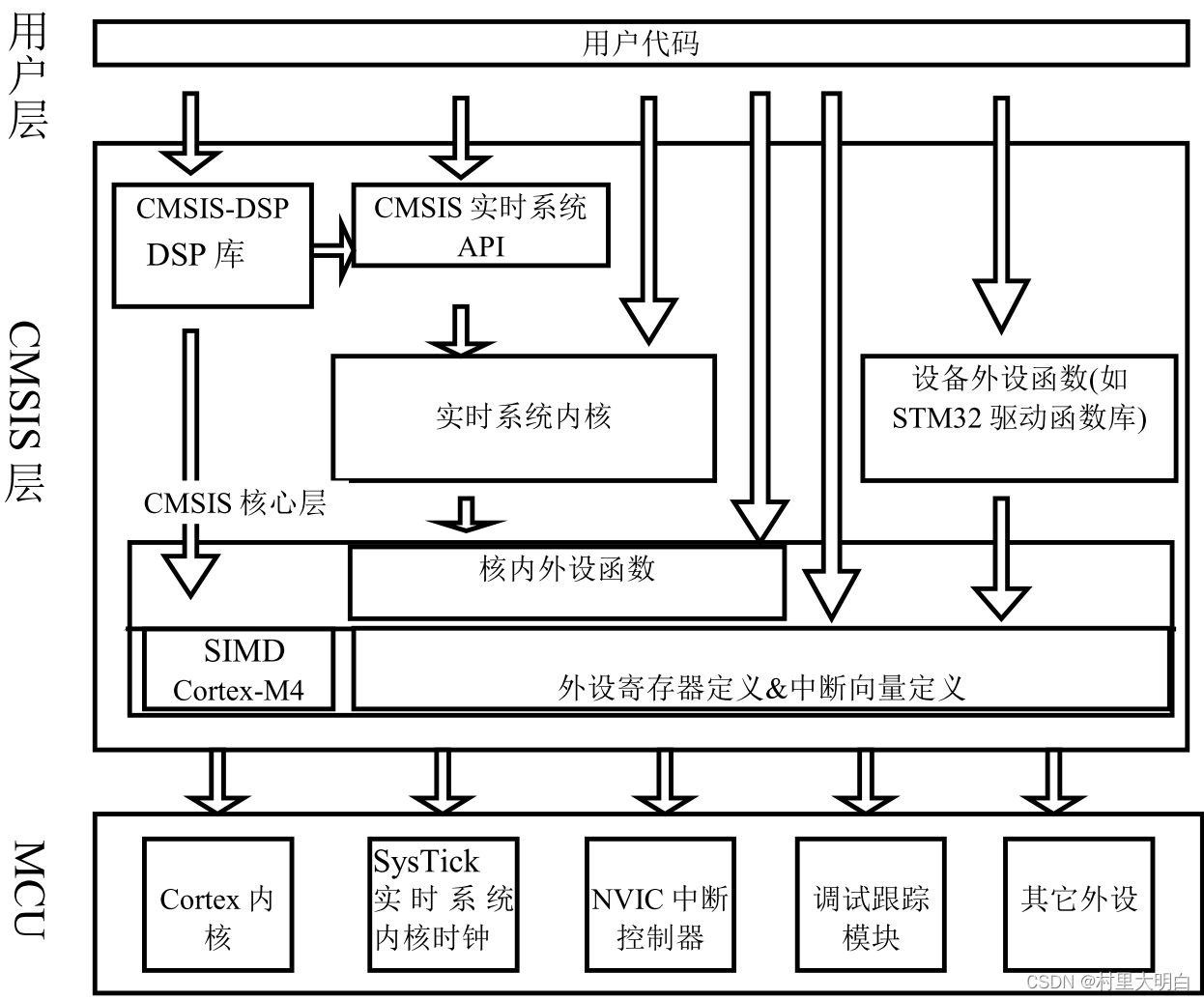

![<span style='color:red;'>第</span>十二<span style='color:red;'>章</span>[模块]:<span style='color:red;'>12</span>.5:<span style='color:red;'>标准</span><span style='color:red;'>库</span>:zipfile](https://img-blog.csdnimg.cn/img_convert/30fc5f4df35c8e66dd48bd06409ee31a.jpeg)




